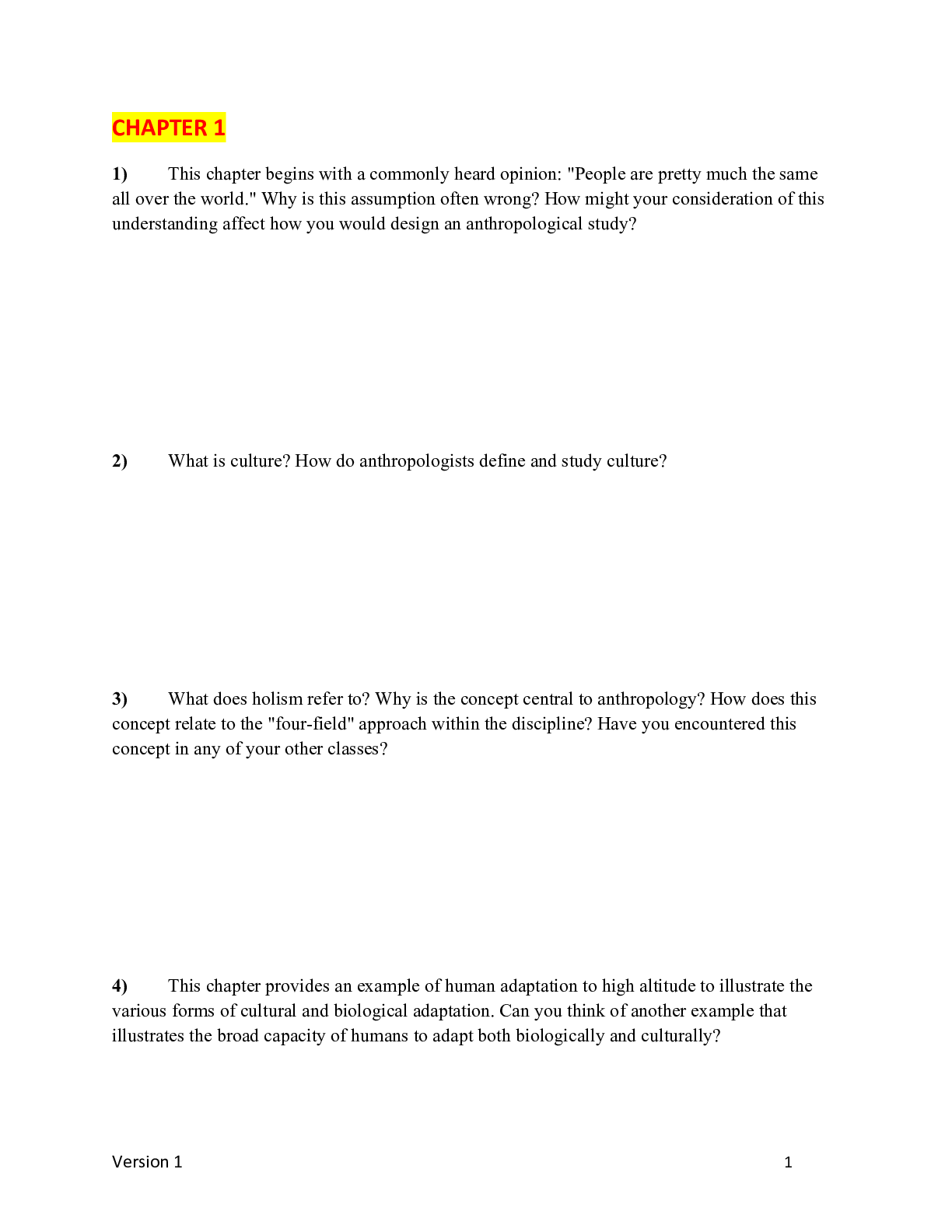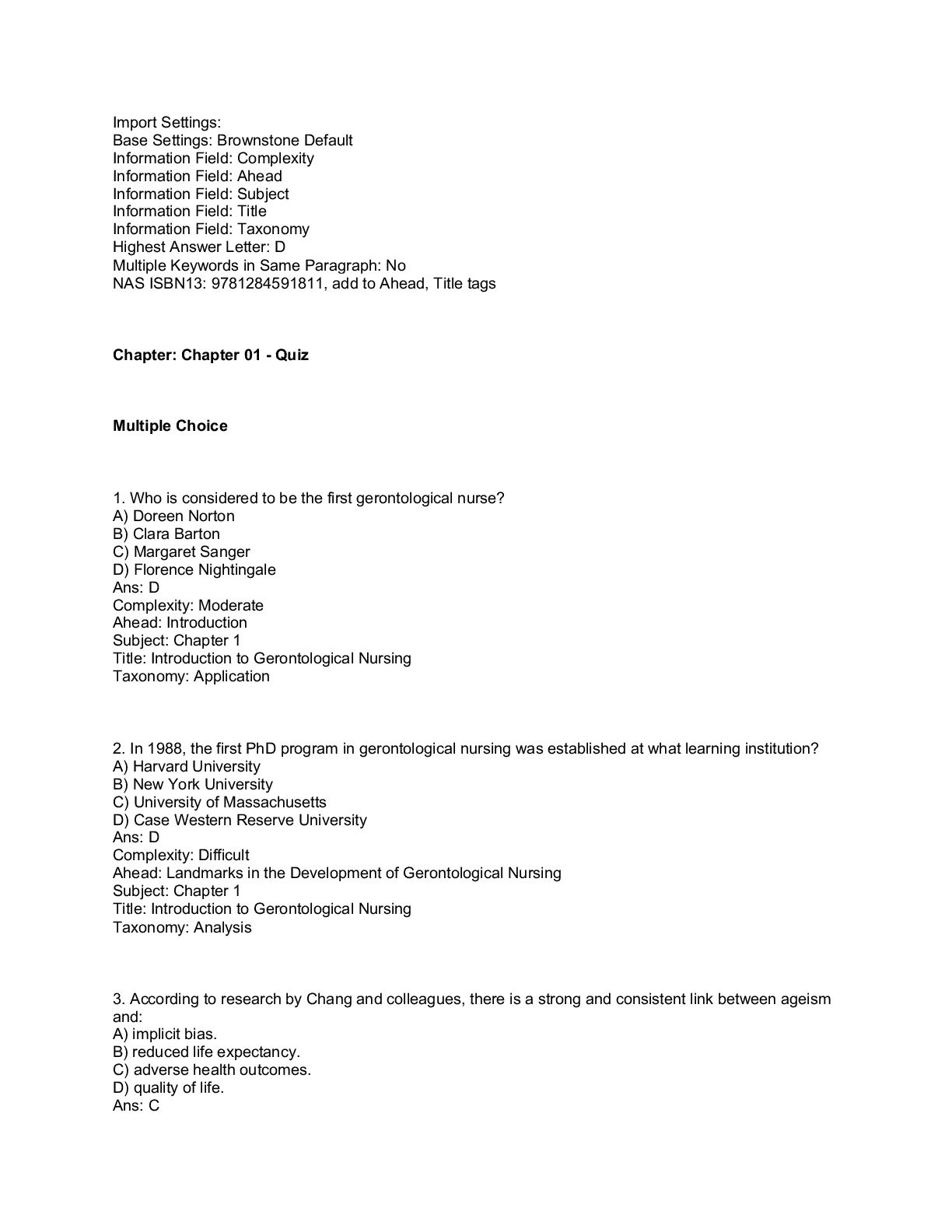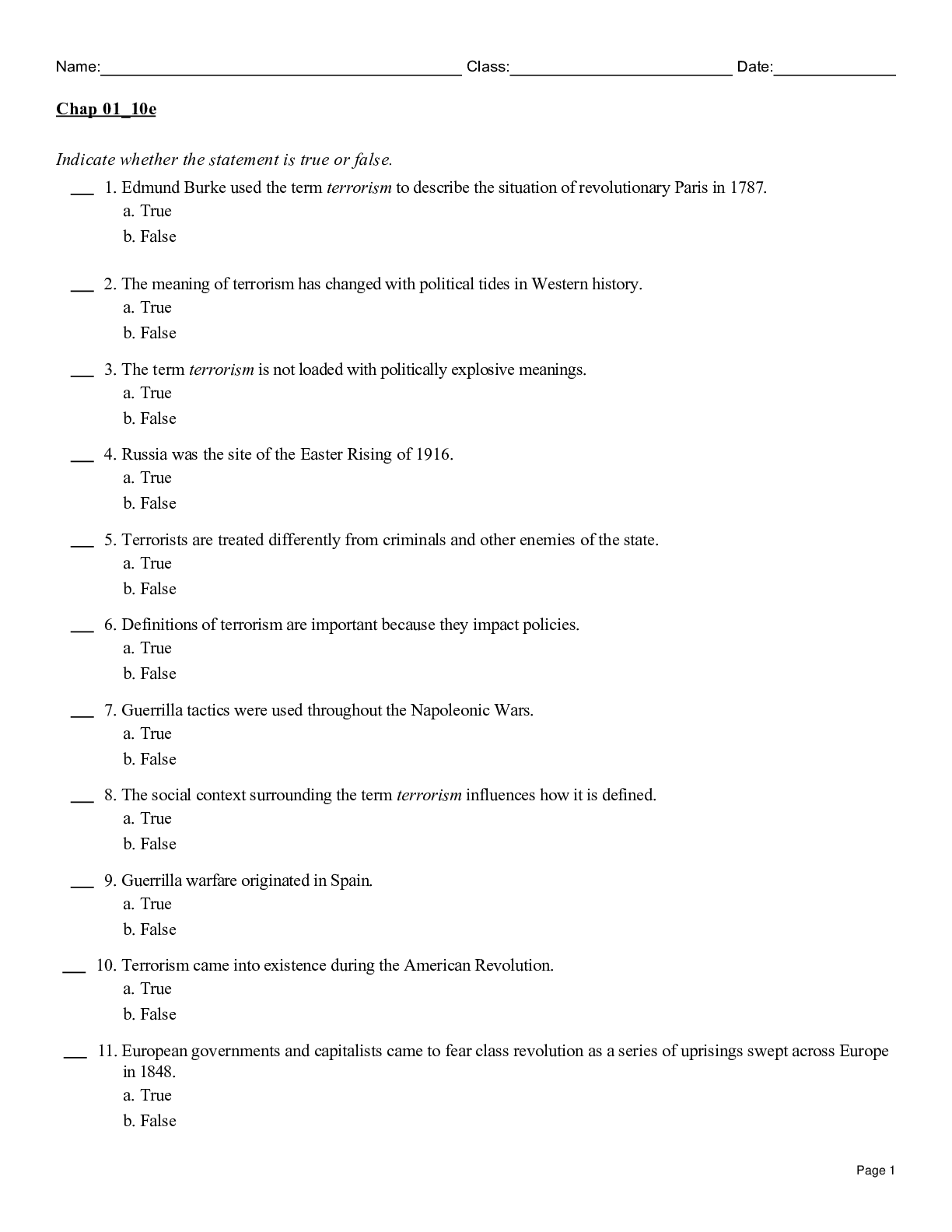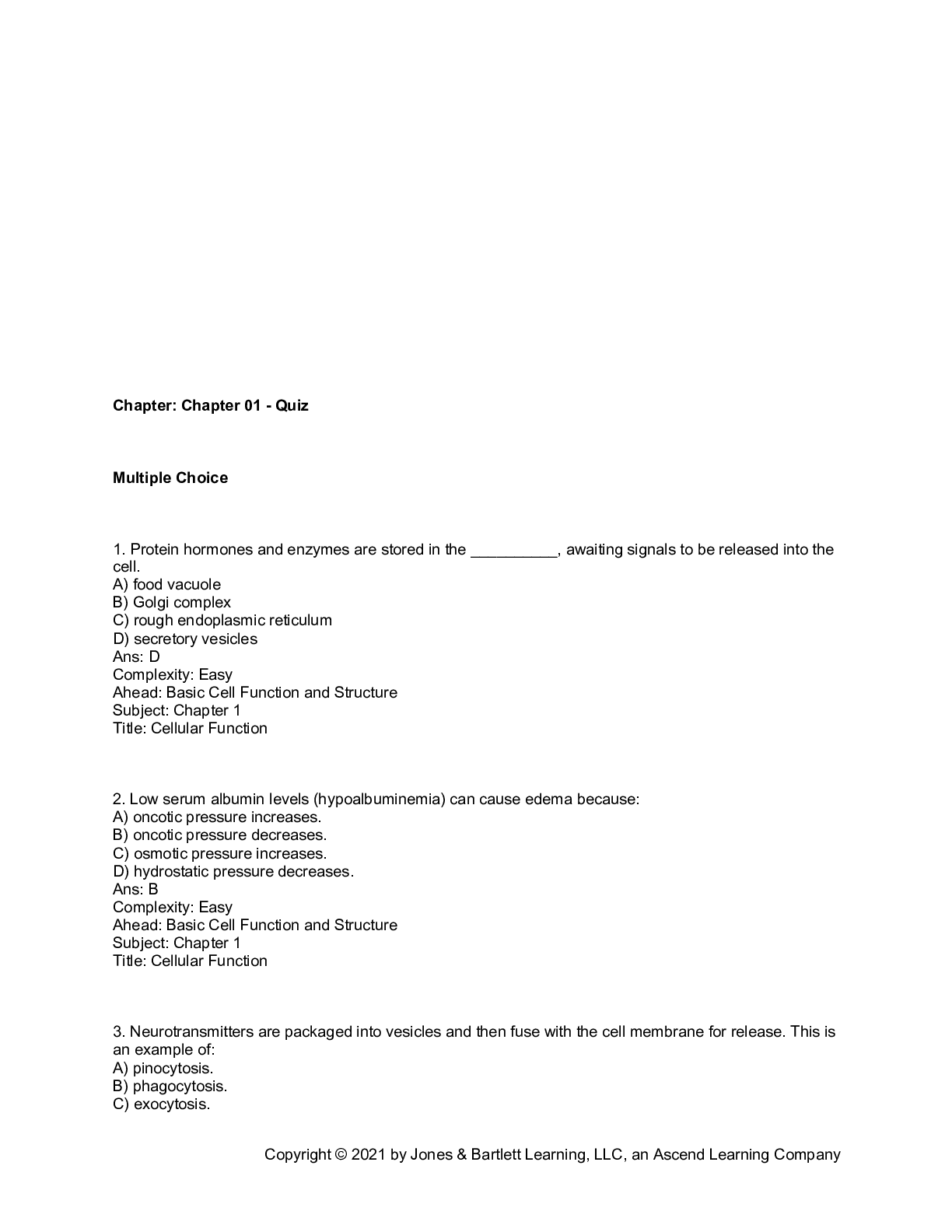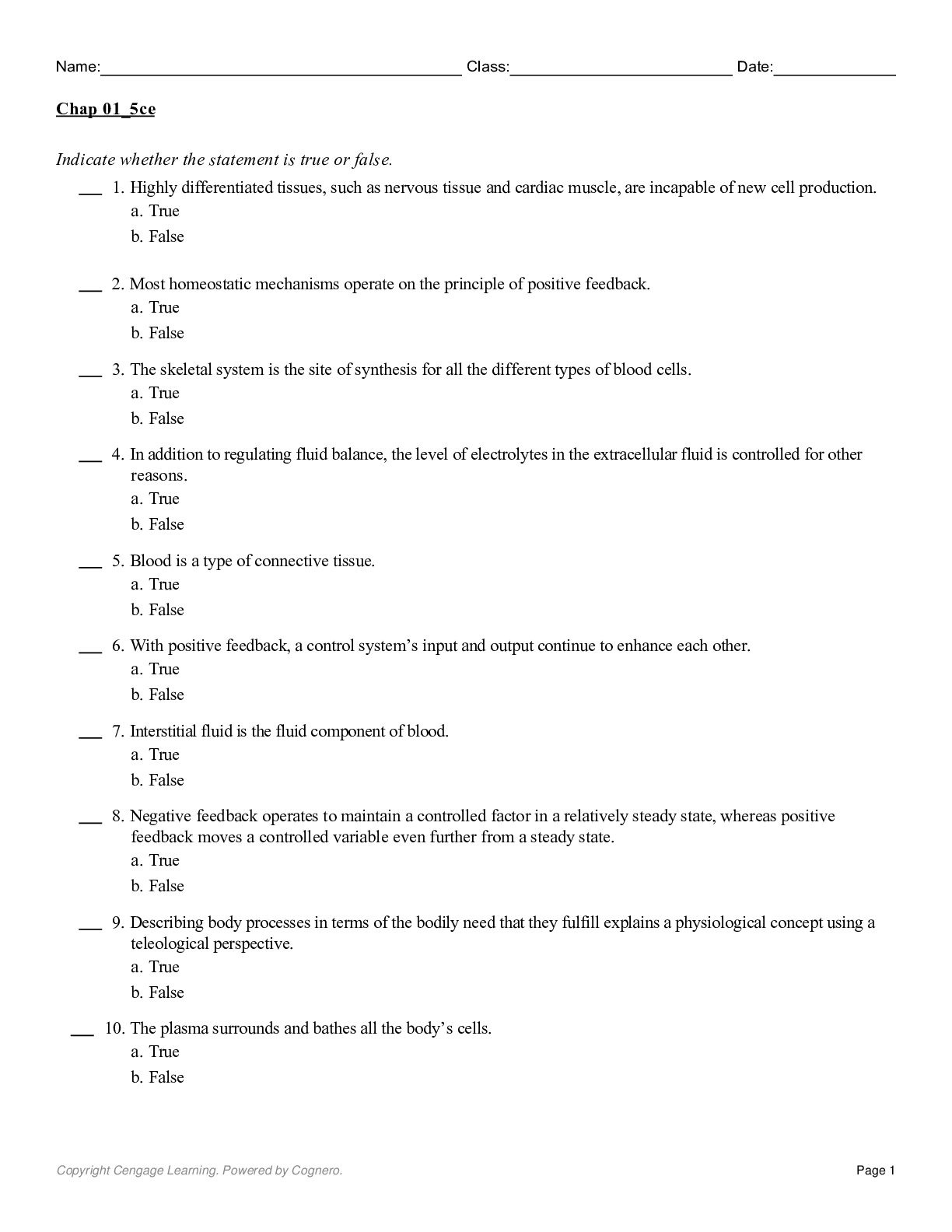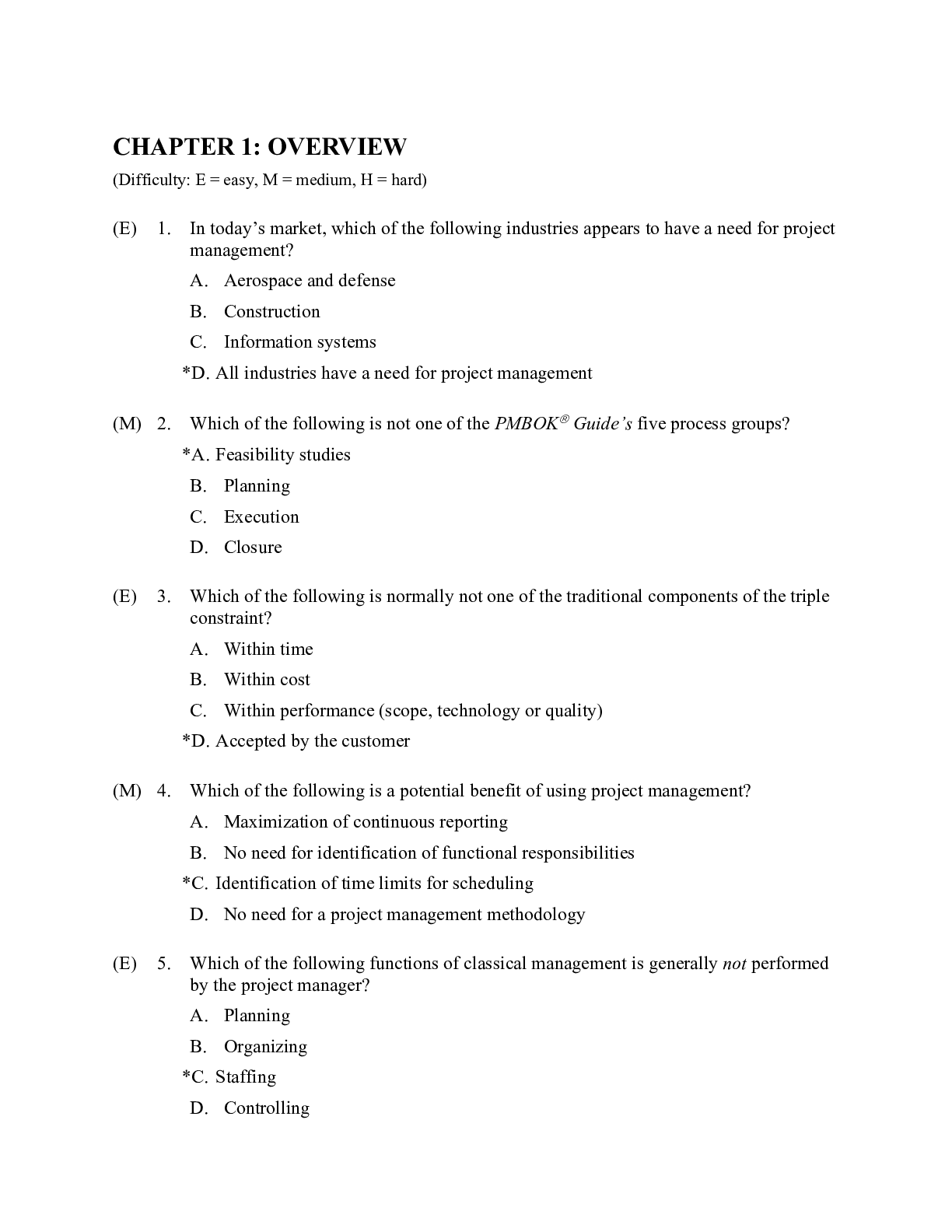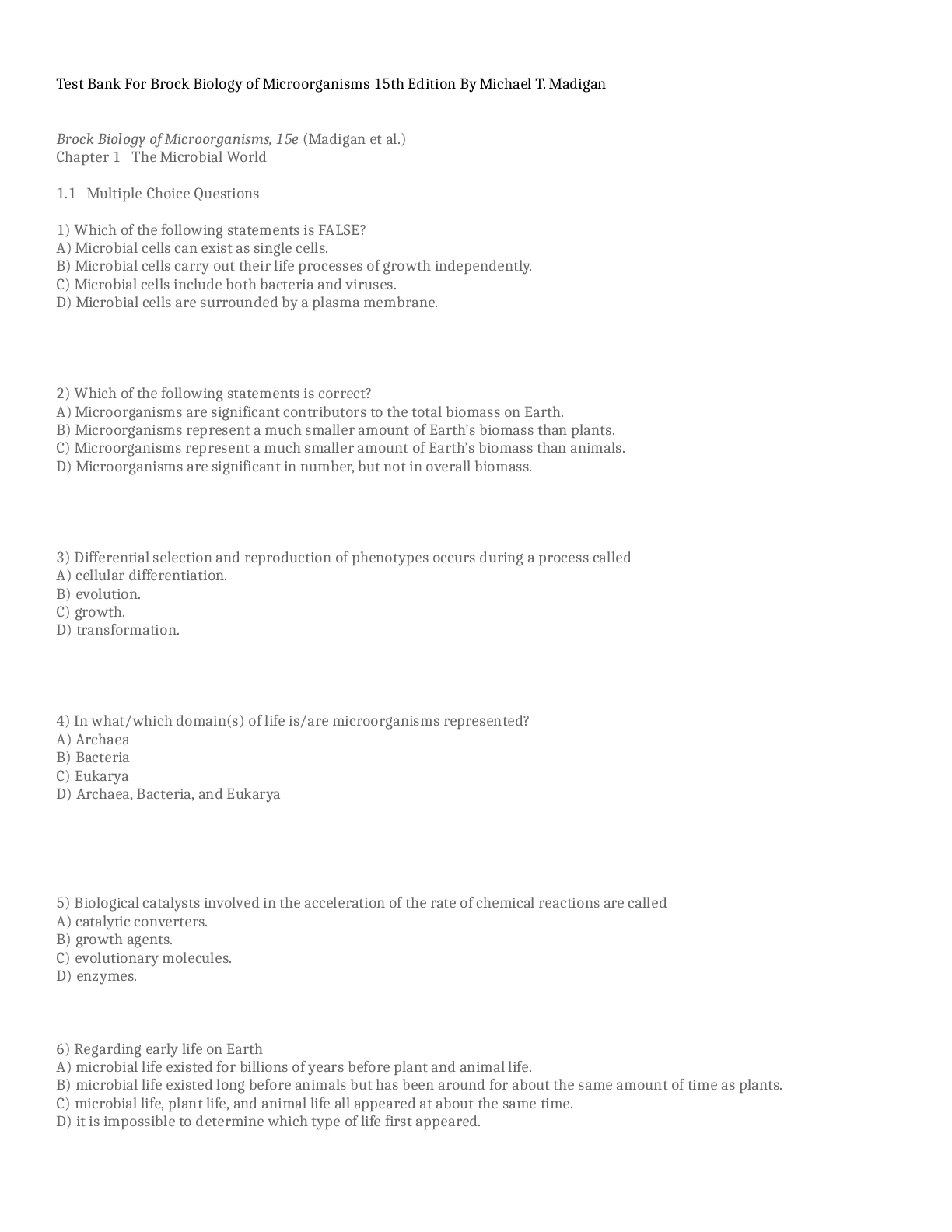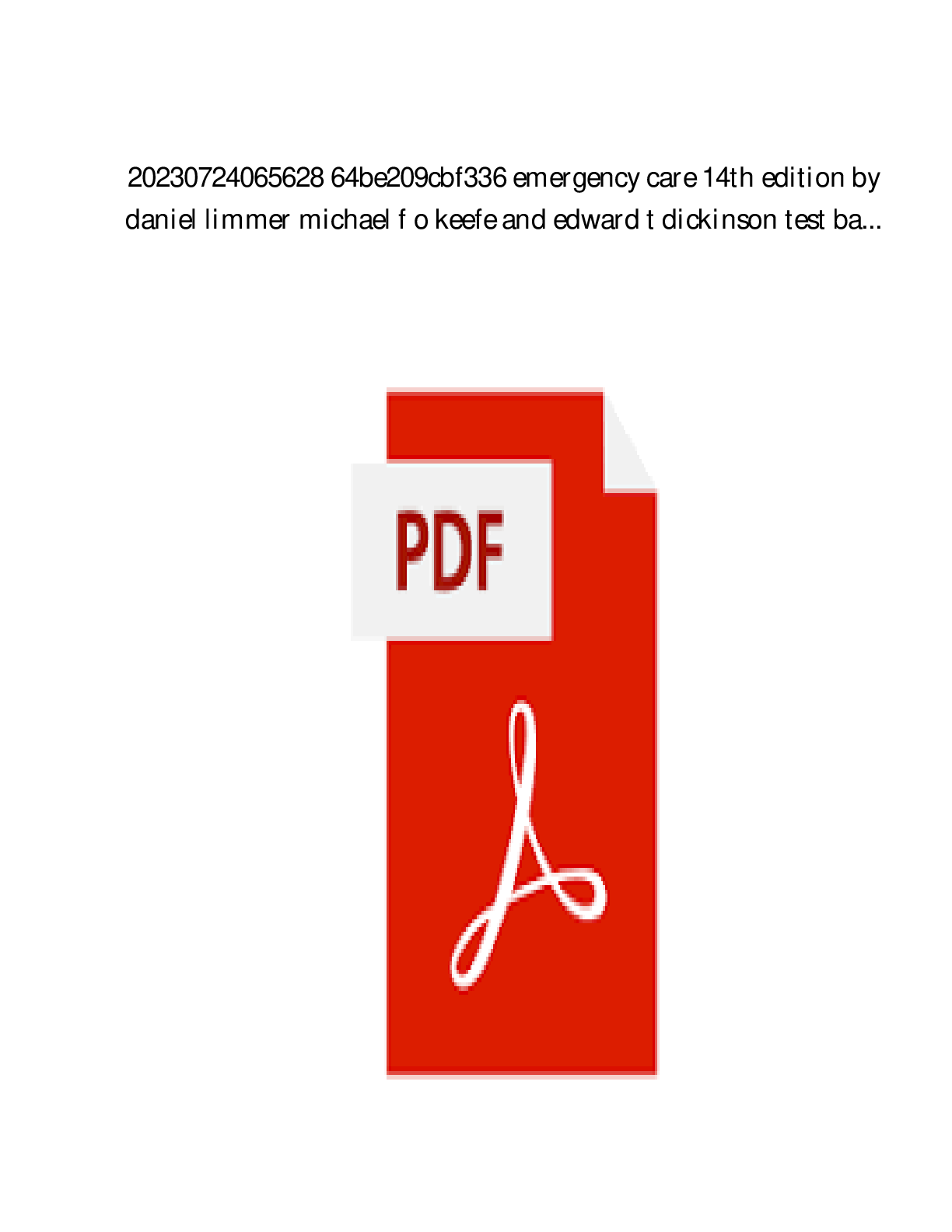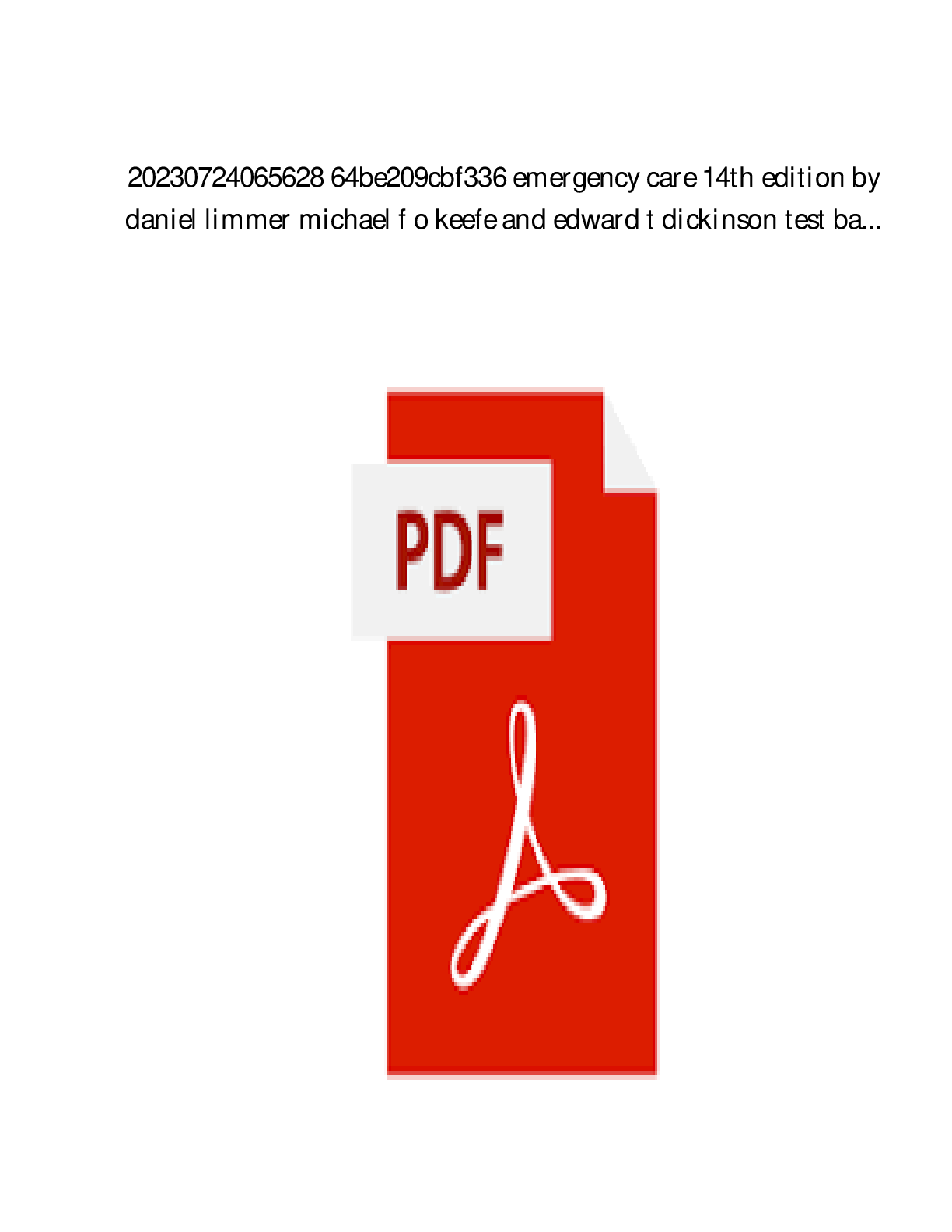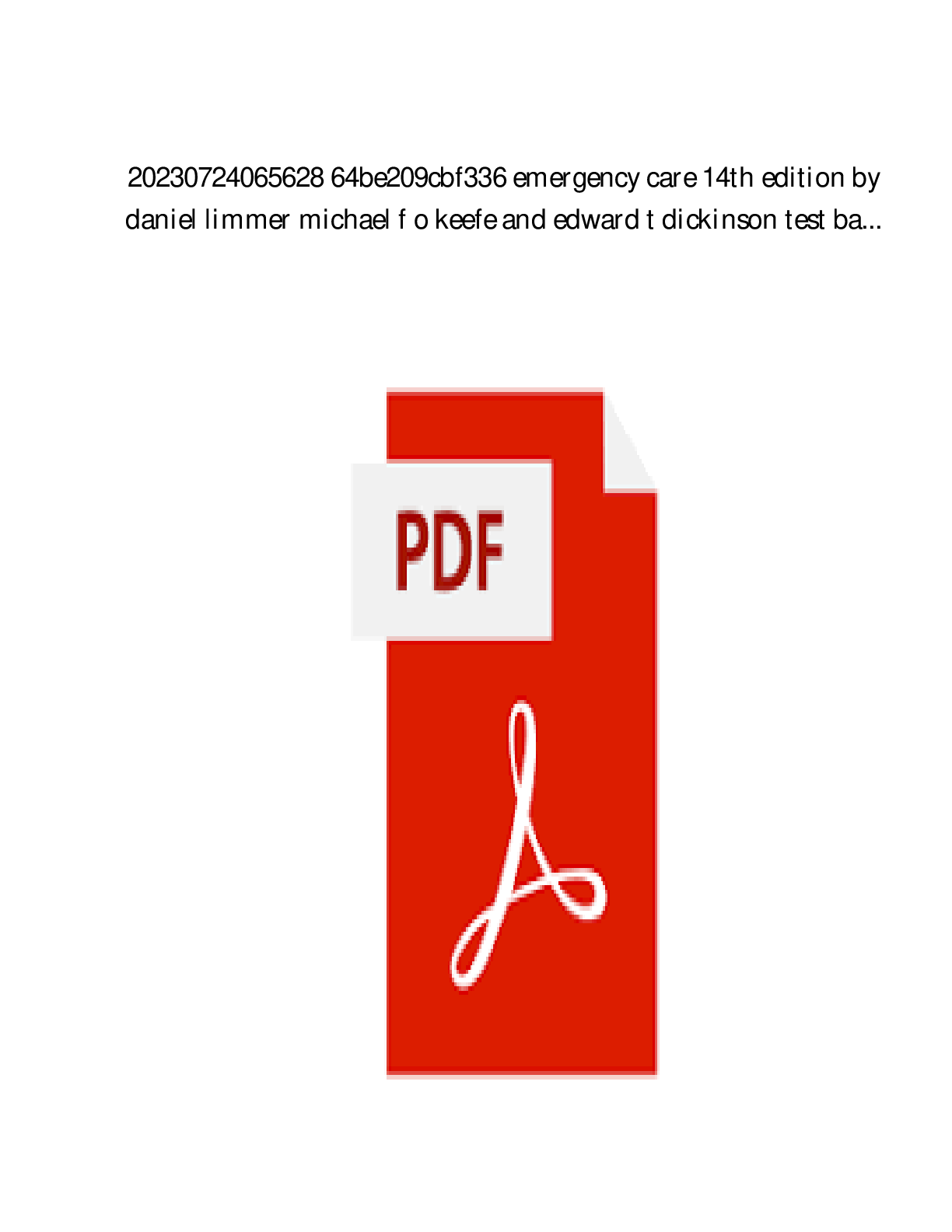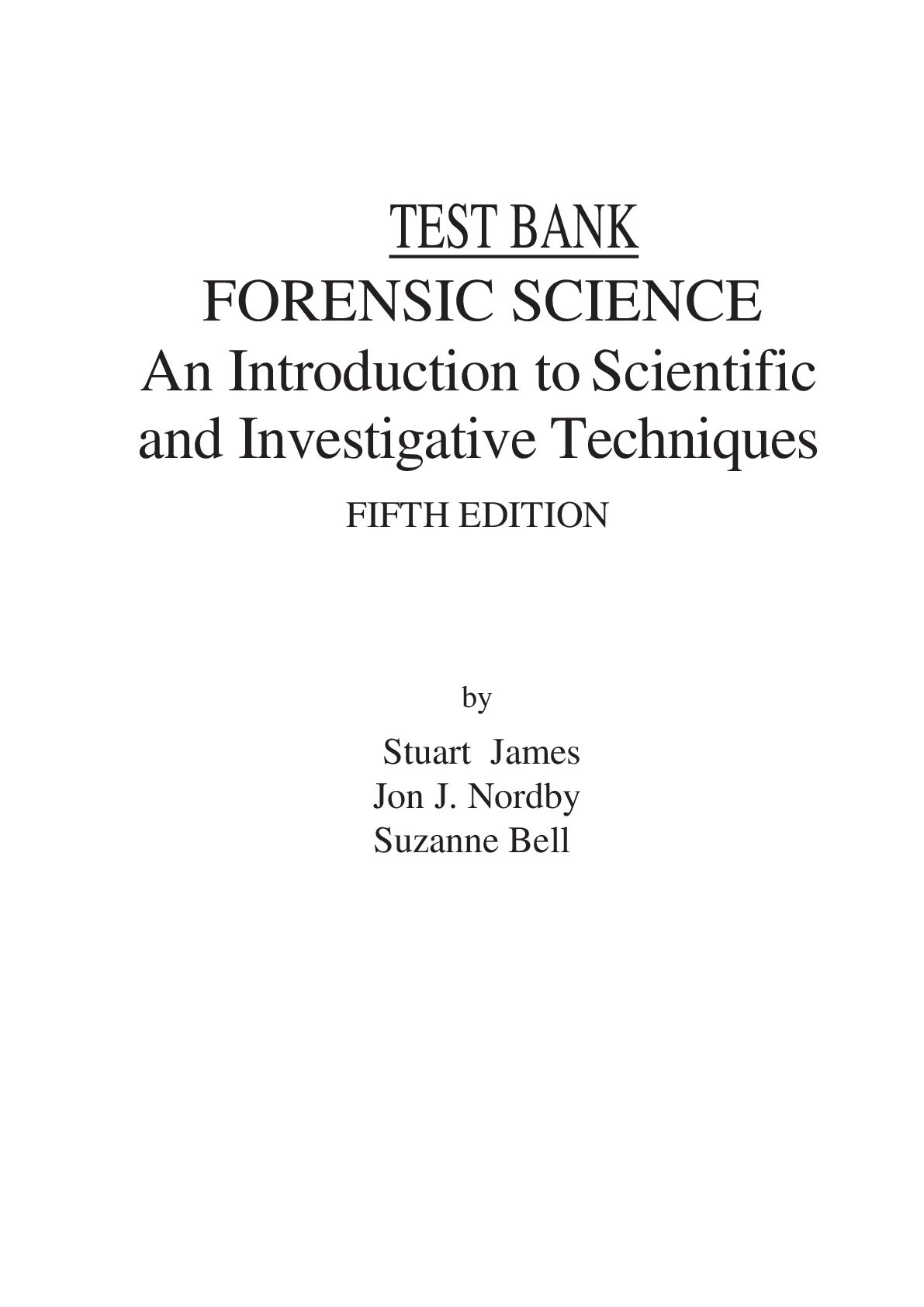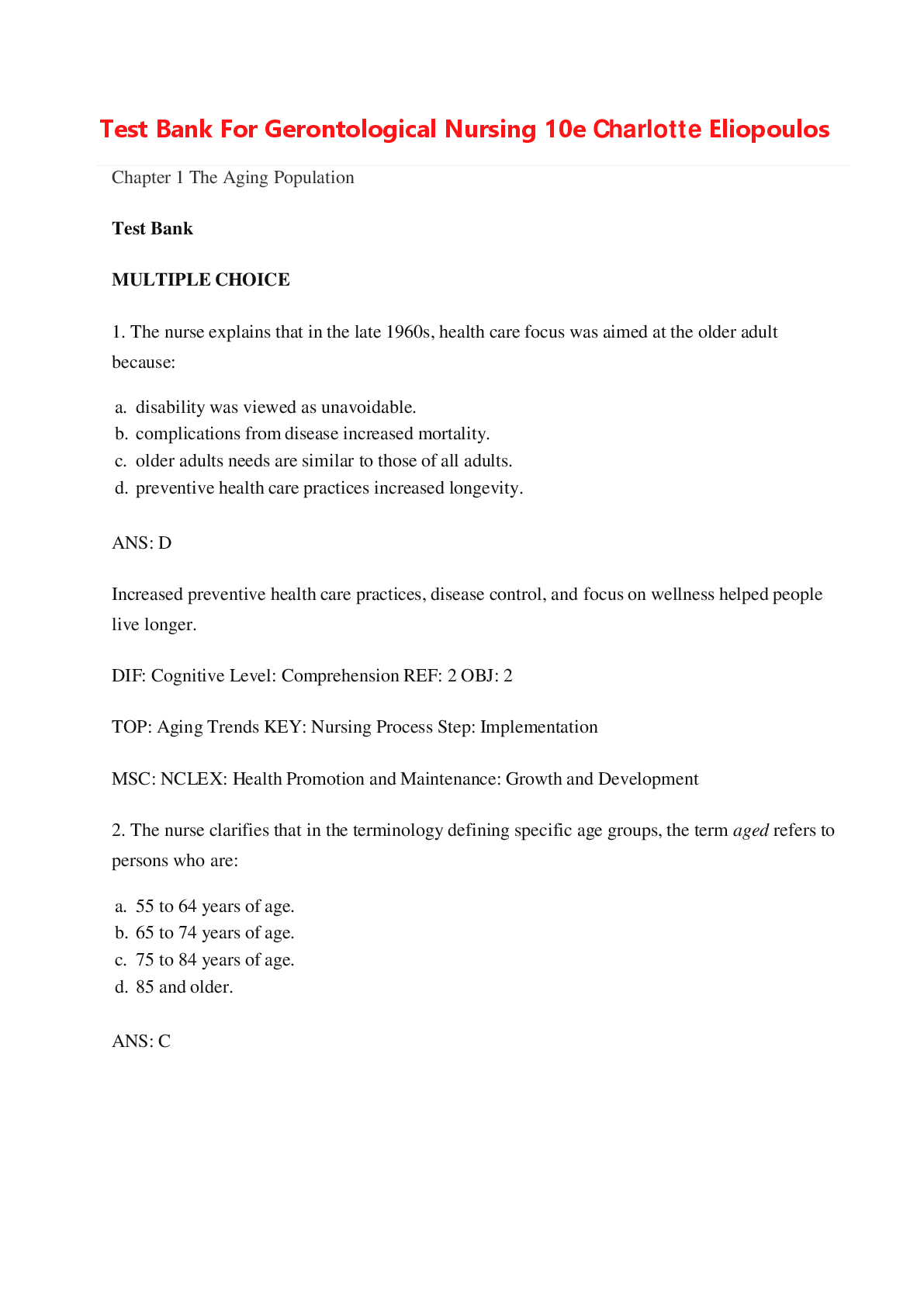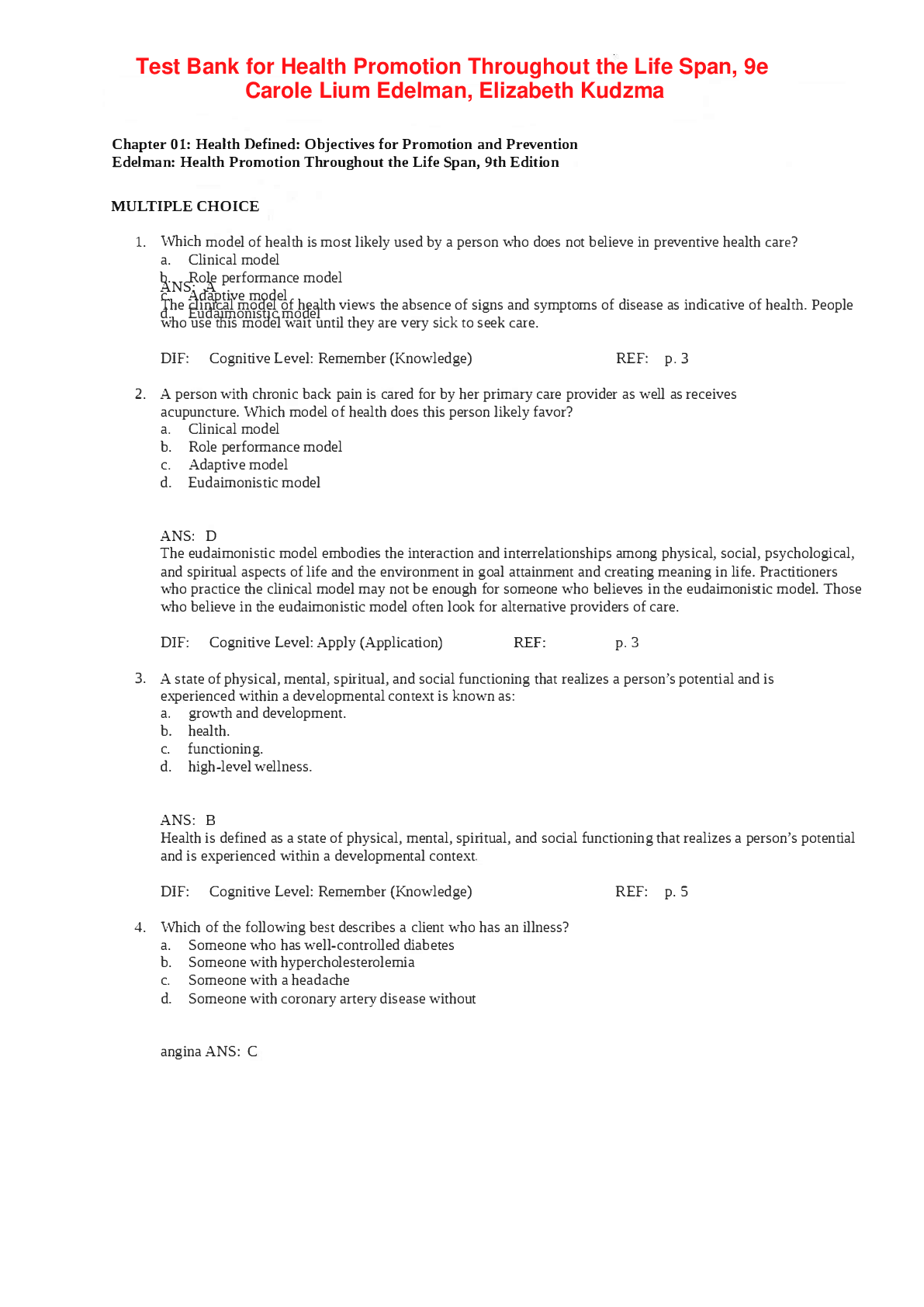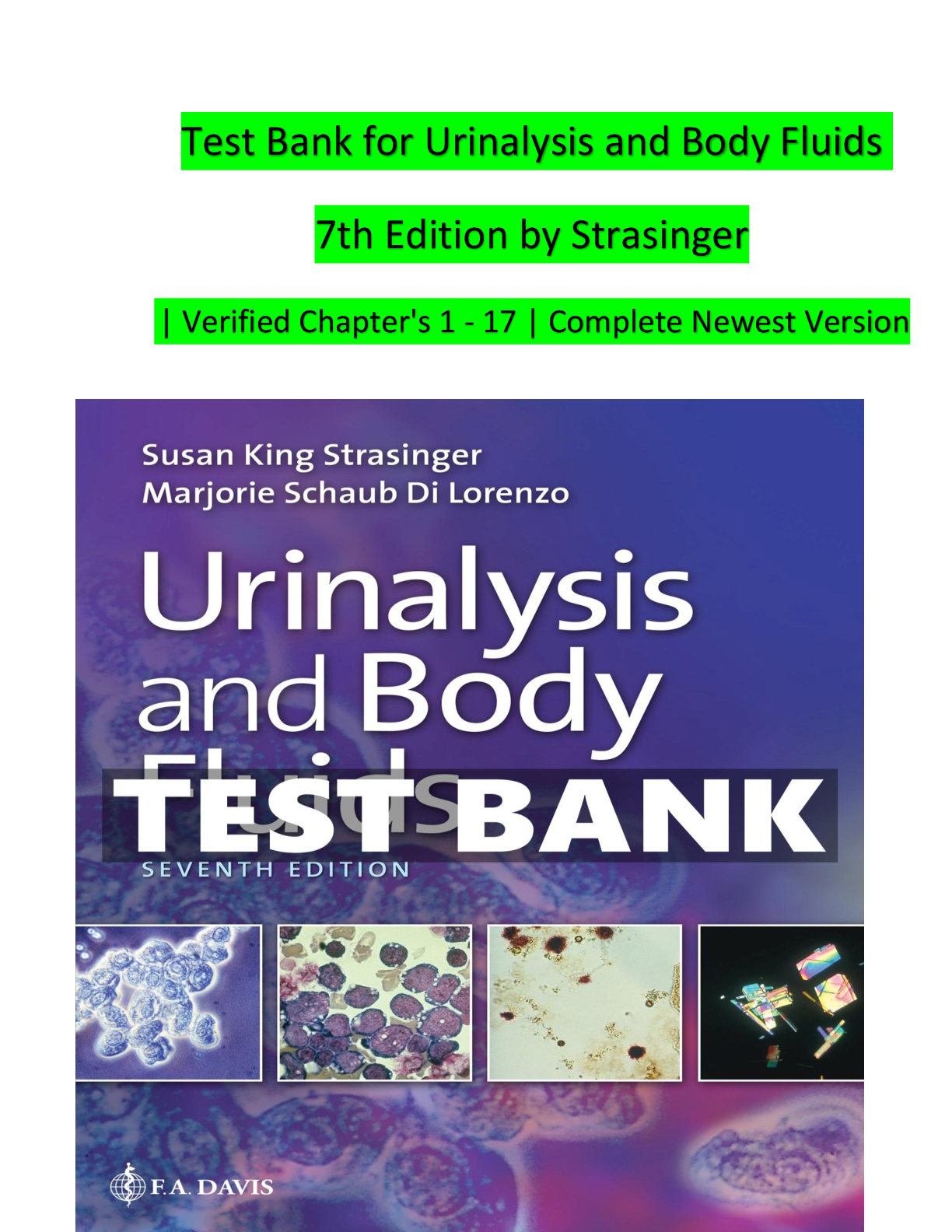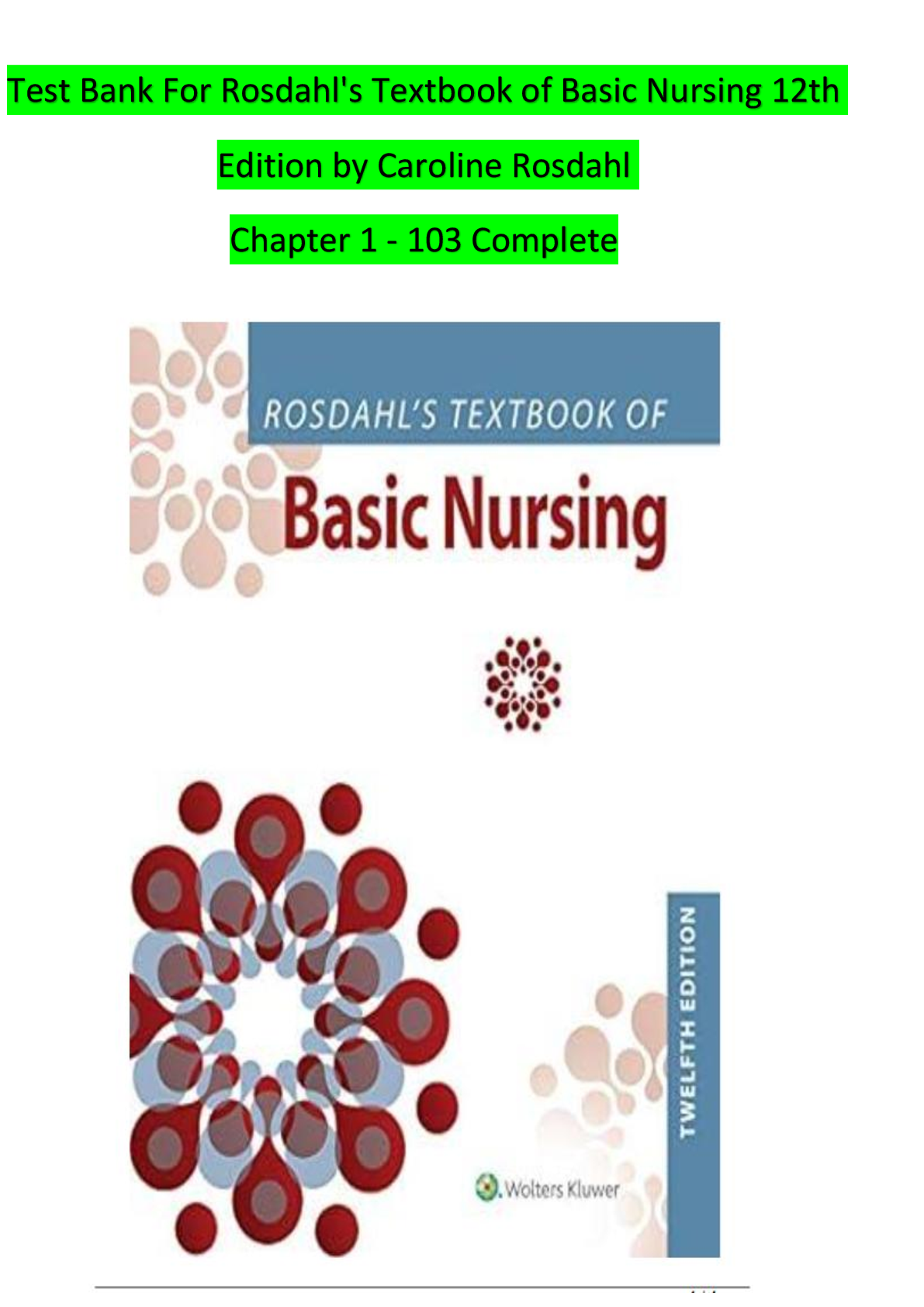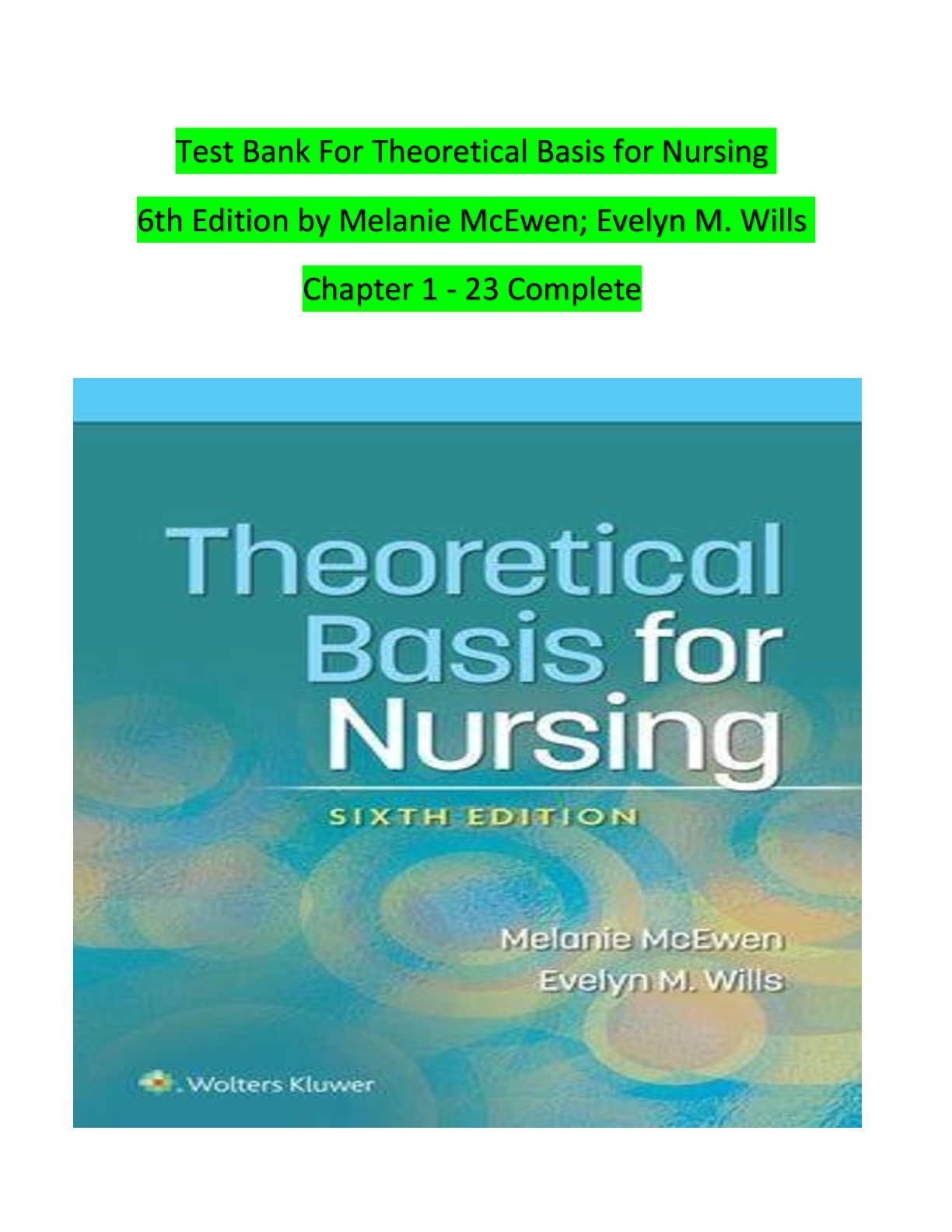Business Law > TEST BANKS > Business Law, 11th Edition by Henry Cheeseman | TEST BANK (All)
Business Law, 11th Edition by Henry Cheeseman | TEST BANK
Document Content and Description Below
Test Bank for Business Law, 11E, 11th Edition by Cheeseman TEST BANK ISBN-13: 9780136828075 Full chapters included Part I Legal Environment, Judicial System, Dispute Resolution, and Constitutiona ... l Law Chapter 1 Legal Heritage and the Information Age Learning Objectives Introduction to Legal Heritage and the Information Age What Is Law? Definition of Law Fairness of the Law Flexibility of the Law Schools of Jurisprudential Thought Natural Law School Historical School Analytical School Sociological School Command School Critical Legal Studies School Law and Economics School History of American Law English Common Law Law Courts Chancery (Equity) Courts Merchant Courts Sources of Law in the United States Constitutions Treaties Federal Statutes State Statutes Ordinances Executive Orders Regulations and Orders of Administrative Agencies Judicial Decisions Priority of Law in the United States Doctrine of Stare Decisis Law in the Information Age Critical Legal Thinking Defining Critical Legal Thinking Socratic Method IRAC Method Developing Skills for Your Career Key Terms and Concepts Critical Legal Thinking Cases 1.1 School of Jurisprudential Thought 1.2 Fairness of the Law Ethics Cases 1.3 Ethics Case 1.4 Ethics Case Notes Chapter 2 Courts and Jurisdiction Learning Objectives Introduction to Courts, Jurisdiction, and Administrative Law State Court Systems Limited-Jurisdiction Trial Courts General-Jurisdiction Trial Courts Intermediate Appellate Courts Highest State Court Federal Court System Special Federal Courts U.S. District Courts U.S. Courts of Appeals Supreme Court of the United States Jurisdiction of the U.S. Supreme Court Decisions of the U.S. Supreme Court Jurisdiction of Federal and State Courts Federal Question Diversity of Citizenship Jurisdiction of State Courts Full Faith and Credit Clause Standing to Sue, Jurisdiction, and Venue Standing to Sue In Personam Jurisdiction Service of Process Long-Arm Statute In Rem Jurisdiction Quasi in Rem Jurisdiction Venue Forum-Selection and Choice-of-Law Clauses Jurisdiction in Digital Commerce Key Terms and Concepts Critical Legal Thinking Cases 2.1 Personal Jurisdiction 2.2 Service of Process 2.3 Standing to Sue 2.4 Long-Arm Statute 2.5 Standing to Sue 2.6 U.S. Supreme Court Decision Ethics Cases 2.7 Ethics Case 2.8 Ethics Case Notes Chapter 3 Judicial, Alternative, and E-Dispute Resolution Learning Objectives Introduction to Judicial, Alternative, and E-Dispute Resolution Attorney Representation Pretrial Litigation Process Pleadings Complaint and Summons Answer Cross-Complaint and Reply Intervention and Consolidation Statute of Limitations Class Action Discovery Deposition Interrogatories Production of Documents Physical or Mental Examination E-Discovery Pretrial Motions Motion for Judgment on the Pleadings Motion for Summary Judgment Settlement Conference Trial Jury Selection Opening Statements The Plaintiff’s Case The Defendant’s Case Rebuttal and Rejoinder Closing Arguments Jury Instructions, Deliberation, and Verdict Entry of Judgment E-Courts and Information Technology Appeal Alternative Dispute Resolution Negotiation Arbitration Arbitration Procedure Mediation E-Dispute Resolution Key Terms and Concepts Critical Legal Thinking Cases 3.1 Contingency Fee 3.2 Service of Process 3.3 Summary Judgment 3.4 Class Action 3.5 Arbitration 3.6 Arbitration Ethics Cases 3.7 Ethics Case 3.8 Ethics Case Notes Chapter 4 Constitutional Law for Business and E-Commerce Learning Objectives Introduction to Constitutional Law for Business and E-Commerce Constitution of the United States of America Federalism and Delegated Powers Doctrine of Separation of Powers Supremacy Clause Commerce Clause Commerce with Native Americans Indian Gaming Regulatory Act Foreign Commerce Interstate Commerce State Police Power Dormant Commerce Clause E-Commerce and the Constitution Bill of Rights and Other Amendments to the U.S. Constitution Freedom of Speech Fully Protected Speech Limited Protected Speech Unprotected Speech Freedom of Religion Establishment Clause Free Exercise Clause Equal Protection Standards of Review Due Process Substantive Due Process Procedural Due Process Government Taking of Property Privileges and Immunities Key Terms and Concepts Critical Legal Thinking Cases 4.1 Establishment Clause 4.2 Free Speech 4.3 Equal Protection Clause 4.4 Due Process 4.5 Commerce Clause 4.6 Free Speech Ethics Cases 4.7 Ethics Case 4.8 Ethics Case Notes Part II Torts, Crimes, and Intellectual Property Chapter 5 Intentional Torts and Negligence Learning Objectives Introduction to Intentional Torts and Negligence Intentional Torts Assault Battery Transferred Intent Doctrine False Imprisonment Shoplifting and Merchant Protection Statutes Misappropriation of the Right to Publicity Invasion of the Right to Privacy Defamation of Character Public Figures as Plaintiffs Disparagement Intentional Infliction of Emotional Distress Malicious Prosecution Unintentional Torts (Negligence) 1. Duty of Care 2. Breach of the Duty of Care 3. Injury to Plaintiff 4. Actual Cause 5. Proximate Cause Special Negligence Doctrines Professional Malpractice Negligent Infliction of Emotional Distress Negligence Per Se Res Ipsa Loquitur Gross Negligence Attractive Nuisance Doctrine Defenses Against Negligence Superseding or Intervening Event Assumption of the Risk Contributory and Comparative Negligence Contributory Negligence Comparative Negligence Partial Comparative Negligence Strict Liability Key Terms and Concepts Critical Legal Thinking Cases 5.1 Assumption of the Risk 5.2 Gross Negligence 5.3 Proximate Cause 5.4 Disparagement 5.5 Negligence 5.6 Negligence Ethics Cases 5.7 Ethics 5.8 Ethics Case Notes Chapter 6 Product and Strict Liability Learning Objectives Introduction to Product and Strict Liability Product Liability: Negligence Product Liability: Misrepresentation Product Liability: Strict Liability Critical Legal Thinking Questions Parties Who Can Recover for Strict Liability Damages Recoverable for Strict Liability Product Defects Defect in Manufacture Defect in Design Crashworthiness Doctrine Failure to Warn Defect in Packaging Other Defects Defenses to Product Liability Statute of Limitations Plaintiff Partially at Fault Contributory Negligence Comparative Negligence Partial Comparative Negligence Key Terms and Concepts Critical Legal Thinking Cases 6.1 Defect in Design 6.2 Defect in Manufacture 6.3 Design Defect 6.4 Supervening Event 6.5 Design Defect 6.6 Failure to Warn Ethics Cases 6.7 Ethics Case 6.8 Ethics Case Notes Chapter 7 Intellectual Property and Information Technology Learning Objectives Introduction to Intellectual Property and Information Technology Intellectual Property Trade Secret Reverse Engineering Misappropriation of a Trade Secret Economic Espionage Act Patent U.S. Court of Appeals for the Federal Circuit Patent Application Patent Number Subject Matter That Can Be Patented Requirements for Obtaining a Patent Patent Period Patent Infringement Design Patent Copyright Tangible Writing Registration of Copyrights Copyright Period Social Media Platforms Civil Copyright Law: Copyright Infringement Fair Use Doctrine Criminal Copyright Law: No Electronic Theft Act Trademark Registration of a Mark Types of Marks Distinctiveness or Secondary Meaning Trademark Infringement Abandonment of a Mark Generic Names Dilution Key Terms and Concepts Critical Legal Thinking Cases 7.1 Patent 7.2 Trademark 7.3 Copyright 7.4 Trademark 7.5 Copyright 7.6 Fair Use Ethics Cases 7.7 Ethics Case 7.8 Ethics Case Notes Chapter 8 Criminal Law and Cybercrime Learning Objectives Introduction to Criminal Law and Cybercrime Definition of a Crime Penal Codes Parties to a Criminal Action Criminal Penalties Classification of Crimes General Intent and Specific Crimes Nonintent Crimes Strict Liability Crimes Criminal Procedure Arrest Booking Bail and Bail Bonds Indictment or Information Statement Arraignment Nolo Contendere Criminal Trial Common Crimes Murder Felony Murder Rule Robbery Burglary Larceny Theft Receiving Stolen Property Arson Business and White-Collar Crimes Forgery Embezzlement Bribery Extortion Criminal Fraud Mail Fraud, Wire Fraud, and Electronic Communications Fraud Money Laundering Racketeer Influenced and Corrupt Organizations Act (RICO) Criminal RICO Civil RICO Criminal Conspiracy Regulatory Crimes Cybercrimes Computer Fraud and Abuse Act Fourth Amendment Protection from Unreasonable Search and Seizure Exclusionary Rule Search of Electronic Information Searches of Business Premises Fifth Amendment Privilege Against Self-Incrimination Miranda Rights Attorney–Client and Other Privileges Other Constitutional Protections Fifth Amendment Protection Against Double Jeopardy Sixth Amendment Right to a Public Jury Trial Eighth Amendment Protection Against Cruel and Unusual Punishment Key Terms and Concepts Critical Legal Thinking Cases 8.1 Criminal Fraud 8.2 Murder 8.3 Fourth Amendment 8.4 Search 8.5 Search and Seizure 8.6 Fourth Amendment Ethics Cases 8.7 Ethics Case 8.8 Ethics Case Notes Part III Contracts and E-Commerce Chapter 9 Nature of Traditional and E-Contracts Learning Objectives Introduction to Nature of Traditional and E-Contracts Definition of a Contract Parties to a Contract Elements of a Contract Defenses to the Enforcement of a Contract Sources of Contract Law Common Law of Contracts Uniform Commercial Code (UCC) The Restatement of the Law of Contracts Objective Theory of Contracts Classifications of Contracts Bilateral and Unilateral Contracts Bilateral Contracts Unilateral Contracts Incomplete or Partial Performance Formal and Informal Contracts Formal Contracts Informal Contracts Valid, Void, Voidable, and Unenforceable Contracts Executory and Executed Contracts Executory Contracts Executed Contracts Express and Implied Contracts Express Contract Implied-in-Fact Contract Implied-in-Law Contract (Quasi Contract) Equity E-Commerce Key Terms and Concepts Critical Legal Thinking Cases 9.1 Implied-in-Fact Contract 9.2 Unilateral Contract 9.3 Objective Theory of Contracts 9.4 Objective Theory of Contracts Ethics Case 9.5 Ethics Case Notes Chapter 10 Agreement Learning Objectives Introduction to Agreement Agreement Offer and Acceptance Offer Express Terms Implied Terms Communication of an Offer Special Offers Advertisements Rewards Auctions Termination of an Offer by Act of the Parties Revocation of an Offer by the Offeror Rejection of an Offer by the Offeree Counteroffer by the Offeree Termination of an Offer by Operation of Law Destruction of the Subject Matter Death or Incompetency of the Offeror or Offeree Supervening Illegality Lapse of Time Acceptance Who Can Accept an Offer? Unequivocal Acceptance Silence as Acceptance Time of Acceptance Mode of Acceptance Key Terms and Concepts Critical Legal Thinking Cases 10.1 Mirror Image Rule 10.2 Agreement 10.3 Solicitation to Make an Offer 10.4 Counteroffer Ethics Cases 10.5 Ethics Case Notes Chapter 11 Consideration and Promissory Estoppel Learning Objectives Introduction to Consideration and Promissory Estoppel Consideration Requirements of Consideration Gift Promise Promises That Lack Consideration Illegal Consideration Illusory Promise Preexisting Duty Past Consideration Special Business Contracts Output Contract Requirements Contract Best-Efforts Contract Settlement of Claims Equity: Promissory Estoppel Key Terms and Concepts Critical Legal Thinking Cases 11.1 Lack of Consideration 11.2 Gift Promise 11.3 Consideration Ethics Case 11.4 Ethics Case Note Chapter 12 Capacity and Legality Learning Objectives Introduction to Capacity and Legality Minors Infancy Doctrine Disaffirmance Duties of Restoration and Restitution Ratification Parents’ Liability for Their Children’s Contracts Necessaries of Life Mentally Incompetent Persons Adjudicated Mentally Incompetent Mentally Incompetent but Not Adjudicated Mentally Incompetent Intoxicated Persons Lawful and Illegal Contracts Contracts Contrary to Law Usury Laws Contracts to Commit Crimes Contract in Restraint of Trade Contracts Contrary to Public Policy Gambling Statutes Effects of Illegality Exculpatory Agreements Restrictive Agreements in Employment and Business Contracts Confidentiality Agreements Non-Solicitation Agreements Covenants Not to Compete Licensing Statutes Unconscionable Contracts Elements of Unconscionability Key Terms and Concepts Critical Legal Thinking Cases 12.1 Minor 12.2 Illegal Contract 12.3 Exculpatory Clause 12.4 Exculpatory Clause Ethics Cases 12.5 Ethics Case 12.6 Ethics Case Note Chapter 13 Genuineness of Assent and Undue Influence Learning Objectives Introduction to Genuineness of Assent and Undue Influence Mistake Unilateral Mistake Mutual Mistake of a Material Fact Mutual Mistake of Value Fraud Elements of Fraud Types of Fraud Fraud in the Inception Fraud in the Inducement Fraud by Concealment Silence as Misrepresentation Misrepresentation of Law Innocent Misrepresentation Duress Equitable Doctrine: Undue Influence Key Terms and Concepts Critical Legal Thinking Cases 13.1 Unilateral Mistake 13.2 Fraud 13.3 Undue Influence 13.4 Duress Ethics Case 13.5 Ethics Case Notes Chapter 14 Statute of Frauds and Equitable Exceptions Learning Objectives Introduction to Statute of Frauds and Equitable Exceptions Statute of Frauds for Common Contracts Executory Contracts Executed Contracts Contracts Involving Interests in Real Property One-Year Rule Guaranty Contract The “Main Purpose” Exception Agents’ Contracts Promises Made in Consideration of Marriage Ucc Statute of Fraud UCC: Contract for the Sale of Goods UCC: Contract for the Lease of Goods. Equitable Doctrine: Part Performance Formality of the Writing Required Signature Integration of Several Writings Interpreting Contract Words and Terms Parol Evidence Rule Merger, or Integration, Clause Exceptions to the Parol Evidence Rule Equitable Doctrine: Promissory Estoppel Key Terms and Concepts Critical Legal Thinking Cases 14.1 Statute of Frauds 14.2 Guaranty Contract 14.3 Sufficiency of a Writing Ethics Case 14.4 Ethics Case Notes Chapter 15 Third-Party Rights and Discharge Learning Objectives Introduction to Third-Party Rights and Discharge Assignment of a Right Form of Assignment Personal Service Contract Assignment of a Future Right Contract Where an Assignment Would Materially Alter the Risk Assignment of a Legal Action Effect of an Assignment of a Right Notice of Assignment Anti-Assignment Clause Approval Clause Successive Assignment of the Same Right Delegation of a Duty Duties That Can and Cannot Be Delegated Effect of Delegation of Duties Anti-Delegation Clause Assignment and Delegation Third-Party Beneficiary Intended Beneficiary Donee Beneficiary Creditor Beneficiary Incidental Beneficiary Covenants Conditions Condition Precedent Condition Precedent Based on Satisfaction Condition Subsequent Concurrent Conditions Implied Condition Discharge of Performance Discharge by Agreement Force Majeure Clause Statute of Limitations Key Terms and Concepts Critical Legal Thinking Cases 15.1 Intended or Incidental Beneficiary 15.2 Third-Party Beneficiary 15.3 Assignment 15.4 Delegation of Duties 15.5 Condition Ethics Case 15.6 Ethics Case Notes Chapter 16 Breach of Contract and Remedies Learning Objectives Introduction to Breach of Contract and Remedies Performance and Breach Complete Performance Substantial Performance: Minor Breach Inferior Performance: Material Breach Anticipatory Breach Monetary Damages Compensatory Damages Sale of a Good Construction Contract Employment Contract Consequential Damages Disclaimer of Consequential Damages Nominal Damages Mitigation of Damages Liquidated Damages Penalty Rescission and Restitution Equitable Remedies Specific Performance Reformation Injunction Arbitration of Contract Disputes Torts Associated with Contracts Intentional Interference with Contractual Relations Key Terms and Concepts Critical Legal Thinking Cases 16.1 Liquidated Damages 16.2 Liquidated Damages 16.3 Damages 16.4 Damages Ethics Cases 16.5 Ethics Case 16.6 Ethics Case Notes Chapter 17 Digital Law and E-Commerce Learning Objectives Introduction to Digital Law and E-Commerce Email and Text Contracts E-Commerce and Web Contracts Counteroffers Ineffectual Against an Electronic Agent E-Sign Act E-SIGN Act and Writing Requirement E-Signatures E-Licensing of Software and Information Rights License E-License Licensing Agreement Unfair Business Practices in the Information Age Telephone Consumer Protection Act (TCPA) Do-Not-Call Registry Controlling the Assault of Non-Solicited Pornography and Marketing Act (CAN-SPAM Act) Internet Service Providers (ISPs) Domain Names Registration of Domain Names Domain Name Extensions Specific Domain Names Country Domain Names Anticybersquatting Consumer Protection Act Key Terms and Concepts Critical Legal Thinking Cases 17.1 Cybersquatting 17.2 Internet Service Provider 17.3 Email Contract 17.4 Electronic Signature Ethics Case 17.5 Ethics Case Notes Part IV Sales and Lease Contracts and Warranties Chapter 18 Formation of Sales and Lease Contracts Learning Objectives Introduction to Formation of Sales and Lease Contracts Uniform Commercial Code Article 2 (Sales) What Is a Sale? What Are Goods? Who Are Sellers? Goods versus Services Who Is a Merchant? Article 2A (Leases) Definition of Lease Finance Lease Formation of Sales and Lease Contracts: Offer Open Terms Consideration Formation of Sales and Lease Contracts: Acceptance Method and Manner of Acceptance Accommodation Shipment UCC Statute of Frauds Exceptions to the UCC Statute of Frauds When Written Modification Is Required Parol Evidence Rule Electronic Sales and Lease Contracts Letters of Credit Key Terms and Concepts Critical Legal Thinking Cases 18.1 Good or Service 18.2 Battle of the Forms 18.3 Open Terms 18.4 Good or Service Ethics Cases 18.5 Ethics Case 18.6 Ethics Case Chapter 19 Title to Goods and Risk of Loss Learning Objectives Introduction to Title to Goods and Risk of Loss Identification of Goods and Passage of Title Identification of Goods Passage of Title to Goods Shipment and Destination Contracts Delivery of Goods Without Moving Them Risk of Loss Where There Is No Breach of the Sales Contract Carrier Cases: Movement of Goods Noncarrier Cases: No Movement of Goods Goods in the Possession of a Bailee Risk of Loss Where There Is a Breach of the Sales Contract Seller in Breach of a Sales Contract Buyer in Breach of a Sales Contract Risk of Loss in Conditional Sales Sale on Approval Sale or Return Consignment Risk of Loss in Lease Contracts Sale of Goods by Nonowners Stolen Goods Fraudulently Obtained Goods United Nations Convention on Contracts for the International Sale of Goods (CISG) Key Terms and Concepts Critical Legal Thinking Cases 19.1 Conditional Sale 19.2 Identification of Goods 19.3 Entrustment Rule 19.4 Risk of Loss Ethics Cases 19.5 Ethics Case 19.6 Ethics Case Chapter 20 Remedies for Breach of Sales and Lease Contracts Learning Objectives Introduction to Remedies for Breach of Sales and Lease Contracts Seller and Lessor Performance Place of Delivery Perfect Tender Rule Installment Contracts Destruction of Goods Buyer and Lessee Performance Right of Inspection Acceptance Payment Revocation of Acceptance Seller and Lessor Remedies Right to Withhold Delivery Right to Stop Delivery of Goods in Transit Right to Reclaim Goods Right to Dispose of Goods Unfinished Goods Right to Recover the Purchase Price or Rent Right to Recover Damages for Breach of Contract Right to Cancel a Contract Buyer and Lessee Remedies Right to Reject Nonconforming Goods or Improperly Tendered Goods Right to Recover Goods from an Insolvent Seller or Lessor Right to Obtain Specific Performance Right to Replevy Goods Right to Cancel a Contract Right to Recover Damages for Nondelivery or Repudiation Right to Recover Damages for Accepted Nonconforming Goods Additional Performance Issues Assurance of Performance Statute of Limitations Agreements Affecting Remedies Liquidated Damages Key Terms and Concepts Critical Legal Thinking Cases 20.1 Nonconforming Goods 20.2 Right to Cure 20.3 Specific Performance 20.4 Right to Cover Ethics Cases 20.5 Ethics Case 20.6 Ethics Case Chapter 21 Warranties Learning Objectives Introduction to Warranties Express Warranty Creation of an Express Warranty Damages Recoverable for Breach of Warranty Implied Warranties Implied Warranty of Merchantability Implied Warranty of Fitness for Human Consumption Implied Warranty of Fitness for a Particular Purpose Warranty Disclaimers Conspicuous Display of Disclaimer Magnuson-Moss Warranty Act Warranties of Title and Possession Warranty of Good Title Warranty of No Security Interests Warranty Against Infringements Warranty of No Interference Key Terms and Concepts Critical Legal Thinking Cases 21.1 Express Warranty 21.2 “As Is” Warranty Disclaimer 21.3 Implied Warranty of Fitness for a Particular Purpose 21.4 Implied Warranty of Merchantability Ethics Cases 21.5 Ethics Case Note Part V Negotiable Instruments, Banking, and Electronic Financial Transactions Chapter 22 Creation of Negotiable Instruments Learning Objectives Introduction to Creation of Negotiable Instruments Negotiable Instruments Article 3 of the UCC Functions of Negotiable Instruments Types of Negotiable Instruments Draft Trade Acceptance Check Promissory Note Certificate of Deposit Requirements for Creating a Negotiable Instrument 1. Be in Writing 2. Be Signed by the Maker or the Drawer Representative’s Signature 3. Be an Unconditional Promise or Order to Pay Order to Pay Promise to Pay Unconditional 4. State a Fixed Amount of Money Fixed Amount Payable in Money 5. Not Require Any Undertaking in Addition to the Payment of Money 6. Be Payable on Demand or at a Definite Time Payable on Demand Payable at a Definite Time 7. Be Payable to Order or to Bearer Payable to Order Payable to Bearer Prepayment, Acceleration, and Extension Clauses Nonnegotiable Contract Key Terms and Concepts Critical Legal Thinking Cases 22.1 Negotiable Instrument 22.2 Formal Requirements 22.3 Reference to Another Agreement Ethics Case 22.4 Ethics Case Chapter 23 Holder in Due Course and Transferability Learning Objectives Introduction to Holder in Due Course and Transferability Transfer of a Nonnegotiable Contract by Assignment Transfer of a Negotiable Instrument by Negotiation Negotiating Order Paper Negotiating Bearer Paper Transfer of a Negotiable Instrument by Indorsement Types of Indorsements Blank Indorsement Special Indorsement Qualified Indorsement Restrictive Indorsement Misspelled or Wrong Name Multiple Payees or Indorsees Holder in Due Course Requirements for Holder in Due Course Status 1. Taking for Value 2. Taking in Good Faith 3. Taking Without Notice of Defect Overdue Instruments Dishonored Instruments 4. Taking Where There Is No Evidence of Forgery, Alteration, or Irregularity Key Terms and Concepts Critical Legal Thinking Cases 23.1 Payable Jointly 23.2 Assignment Ethics Case 23.3 Ethics Case Chapter 24 Liability, Defenses, and Discharge Learning Objectives Introduction to Liability, Defenses, and Discharge Signature Liability for Negotiable Instruments Signature Defined Primary Liability for Negotiable Instruments Secondary Liability for Negotiable Instruments Unqualified Indorser Qualified Indorser Requirements for Imposing Secondary Liability Liability of an Accommodation Party Agent’s Signature Unauthorized Signature Forged Indorsements Warranty Liability for Negotiable Instruments Transfer Warranties Presentment Warranties Defenses to Payment of Negotiable Instruments Universal (Real) Defenses Personal Defenses Discharge of Liability Key Terms and Concepts Critical Legal Thinking Cases 24.1 Transfer Warranty 24.2 Presentment Warranty Ethics Case 24.3 Ethics Case Note Chapter 25 Banking System and Electronic Financial Transactions Learning Objectives Introduction to the Banking System and Electronic Financial Transactions The Bank–Customer Relationship Uniform Commercial Code Governs Checks and Banking Ordinary Checks Parties to a Check Special Types of Checks Certified Checks Cashier’s Checks Honoring Checks Stale Checks Incomplete Checks Postdated Checks Stop-Payment Orders Overdrafts Wrongful Dishonor Forged Signatures and Altered Checks Forged Signature of the Drawer Altered Checks One-Year Rule Series of Forgeries The Collection Process Federal Reserve System Bank Payment Rules Deferred Posting Settlement Electronic Banking and E-Money Automated Teller Machine Debit Cards Online Banking Mobile Payment Apps Bank Reform Key Terms and Concepts Critical Legal Thinking Cases 25.1 Cashier’s Check 25.2 Overdraft 25.3 Wrongful Dishonor 25.4 Stale Check 25.5 Postdated Check 25.6 Stop Payment Ethics Case 25.7 Ethics Case Notes Part VI Credit, Secured Transactions, and Bankruptcy Chapter 26 Credit, Real Property Financing, and Debtors’ Rights Learning Objectives Introduction To Credit, Real Property Financing, and Debtors’ Rights Credit Unsecured Credit Secured Credit Real Property Financing Mortgage Note and Deed of Trust Recording Statute Foreclosure Sale Deficiency Judgment Right of Redemption Surety and Guaranty Arrangements Surety Arrangement Guaranty Arrangement Defenses of a Surety or Guarantor Collection Remedies Writ of Attachment Writ of Execution Writ of Garnishment Consumer Financial Protection Truth-in-Lending Act Regulation Z Consumer Leasing Act Fair Credit Billing Act Fair Credit Reporting Act Fair Debt Collection Practices Act Equal Credit Opportunity Act Fair Credit and Charge Card Disclosure Act Key Terms and Concepts Critical Legal Thinking Cases 26.1 Lien 26.2 Foreclosure 26.3 Redemption 26.4 Deficiency Judgment Ethics Cases 26.5 Ethics Case 26.6 Ethics Case Notes Chapter 27 Secured Transactions Learning Objectives Introduction to Secured Transactions Secured Transactions in Personal Property Secured Transaction Two-Party Secured Transaction Three-Party Secured Transaction Personal Property Subject to a Security Agreement Tangible Collateral Intangible Collateral Creating a Security Interest Security Agreement and Attachment Floating Lien Perfecting a Security Interest Perfection by Filing a Financing Statement Perfection by Possession of Collateral Perfection by a Purchase Money Security Interest in Consumer Goods Termination Statement Priority of Claims Default and Remedies Taking Possession of the Collateral Retention of the Collateral Disposing of the Collateral Deficiency Judgment Redemption Rights Relinquishing the Security Interest and Proceeding to Judgment on the Underlying Debt Key Terms and Concepts Critical Legal Thinking Cases 27.1 Financing Statement 27.2 Financing Statement 27.3 Floating Lien 27.4 Purchase Money Security Interest 27.5 Buyer in the Ordinary Course of Business Ethics Cases 27.6 Ethics Case 27.7 Ethics Case Chapter 28 Bankruptcy and Reorganization Learning Objectives Introduction to Bankruptcy and Reorganization Bankruptcy Law Types of Bankruptcy Bankruptcy Courts Bankruptcy Procedure Prepetition and Postpetition Counseling Filing a Bankruptcy Petition Attorney Certification Order for Relief Meeting of the Creditors Proof of Claim and Proof of Interest Bankruptcy Trustee Discharge of Debts Reaffirmation Agreement Bankruptcy Estate Fraudulent Transfer of Property Prior to Bankruptcy Exempt Property State Exemptions Homestead Exemption Chapter 7—Liquidation Qualifications for Chapter 7 Bankruptcy Statutory Distribution of Property Chapter 7 Discharge Acts That Bar Discharge Chapter 13—Adjustment of Debts of an Individual With Regular Income Filing a Chapter 13 Petition Limitations on Who Can File for Chapter 13 Bankruptcy Property of a Chapter 13 Estate Chapter 13 Plan of Payment Confirmation of a Chapter 13 Plan of Payment Chapter 13 Discharge Chapter 11—Reorganization Debtor-in-Possession Creditors’ Committees Automatic Stay in Chapter 11 Labor Union and Retiree Benefits Contracts Discharge of Debts Chapter 11 Plan of Reorganization Chapter 11 Confirmation of a Plan of Reorganization Small Business Bankruptcy Chapter 12 Bankruptcy Key Terms and Concepts Critical Legal Thinking Cases 28.1 Bankruptcy Estate 28.2 Automatic Stay 28.3 Student Loan 28.4 Discharge Ethics Cases 28.5 Ethics Case 28.6 Ethics Case Notes Part VII Agency, Employment, and Labor Law Chapter 29 Agency Formation and Termination Learning Objectives Introduction to Agency Formation and Termination Employment and Agency Persons Who Can Initiate an Agency Relationship Principal–Agent Relationship Employer–Employee Relationship Independent Contractor Formation of an Agency Express Agency Implied Agency Agency by Ratification Apparent Agency Principal’s Duties Principal’s Duty to Compensate Contingency Fee Principal’s Duty to Reimburse Principal’s Duty to Indemnify Principal’s Duty to Cooperate Agent’s Duties Agent’s Duty to Perform Agent’s Duty to Notify Agent’s Duty to Account Termination of an Agency Termination of an Agency by an Act of the Parties Notice of Termination Termination of an Agency by an Unusual Change of Circumstances Termination of an Agency by Impossibility of Performance Termination of an Agency by Operation of Law Wrongful Termination Key Terms and Concepts Critical Legal Thinking Cases 29.1 Scope of Employment 29.2 Independent Contractor 29.3 Agent 29.4 Scope of Employment 29.5 Imputed Knowledge Ethics Case 29.6 Ethics Case Chapter 30 Liability of Principals, Agents, and Independent Contractors Learning Objectives Introduction to Liability of Principals, Agents, and Independent Contractors Agent’s Duty of Loyalty Self-Dealing Usurping an Opportunity Competing with the Principal Misuse of Confidential Information Dual Agency Tort Liability of Principals and Agents to Third Parties Negligence Frolic and Detour Coming and Going Rule Dual-Purpose Mission Liability for Intentional Torts Misrepresentation Contract Liability of Principals and Agents to Third Parties Fully Disclosed Agency Partially Disclosed Agency Undisclosed Agency Agent Exceeding the Scope of Authority Independent Contractor Factors for Determining Independent Contractor Status Liability for an Independent Contractor’s Torts Liability for an Independent Contractor’s Contracts Key Terms and Concepts Critical Legal Thinking Cases 30.1 Frolic and Detour 30.2 Agent 30.3 Independent Contractor 30.4 Tort Liability 30.5 Independent Contractor Ethics Case 30.6 Ethics Case Chapter 31 Employment, Worker Protection, and Immigration Law Learning Objectives Introduction to Employment, Worker Protection, and Immigration Law Term Employment and Employment at Will Term Employment At-Will Employment Exceptions Workers’ Compensation Workers’ Compensation Insurance Employment-Related Injury Exclusive Remedy Occupational Safety Specific Duty Standards General Duty Standard Fair Labor Standards Act Child Labor Minimum Wage Overtime Pay Blue-Collar Workers First Responders White-Collar Workers Job Titles and Employee Duties Family and Medical Leave Act Consolidated Omnibus Budget Reconciliation Act Employee Retirement Income Security Act Unemployment Compensation Social Security Immigration Law and Employment Temporary Visitors Student Visa H-1B Foreign Guest Worker Visa EB-1 Extraordinary Ability Visa EB-5 Investor Visa H-2A Temporary Agricultural Worker Visa H-2B Temporary Nonagricultural Worker Visa Key Terms and Concepts Critical Legal Thinking Cases 31.1 At-Will Employment 31.2 Fair Labor Standards Act 31.3 Overtime Pay 31.4 Workers’ Compensation Ethics Cases 31.5 Ethics Case 31.6 Ethics Case Notes Chapter 32 Labor Law Learning Objectives Introduction to Labor Law Labor Law National Labor Relations Board Organizing a Union Types of Union Elections Union Solicitation on Company Property Illegal Interference with an Election Collective Bargaining Union Security Agreements State Right-to-Work Laws Federal Employees Strikes Cooling-Off Period No-Strike Clause Illegal Strikes Crossover and Replacement Workers Employer Lockout Picketing Secondary Boycott Picketing Internal Union Affairs Key Terms and Concepts Critical Legal Thinking Cases 32.1 Unfair Labor Practice 32.2 Right-to-Work Law 32.3 Unfair Labor Practice 32.4 Illegal Strike 32.5 Replacement Workers 32.6 Union Shop Agreement Ethics Case 32.7 Ethics Case Notes Chapter 33 Equal Opportunity in Employment Learning Objectives Introduction to Equal Opportunity in Employment Equal Employment Opportunity Commission Complaint Process Lilly Ledbetter Fair Pay Act of 2009 Title VII of the Civil Rights Act of 1964 Scope of Coverage of Title VII Disparate-Treatment Discrimination Disparate-Impact Discrimination Remedies for Violations of Title VII Race and Color Discrimination Race Discrimination Color Discrimination National Origin Discrimination Gender Discrimination Gender Discrimination Pregnancy Discrimination Act Sexual Orientation and Gender Identity Discrimination LGBTQ+ Employment Rules Harassment Affirmative Defense Classification of Harasser Racial and National Origin Harassment Sexual Harassment Other Types of Harassment Religious Discrimination Defenses to a Title VII Action Bona Fide Occupational Qualification Equal Pay Act Criteria That Justify a Differential in Wages Age Discrimination Discrimination Against Individuals with Disabilities Qualified Individual with a Disability Limits on Employer Questions Reasonable Accommodation Undue Hardship Uncovered Conditions Genetic Information Discrimination Genetic Information Nondiscrimination Act Protection from Retaliation Veterans and Military Personnel Affirmative Action Affirmative Action Plan Reverse Discrimination Key Terms and Concepts Critical Legal Thinking Cases 33.1 Sexual Harassment 33.2 Sexual Harassment 33.3 National Origin Discrimination 33.4 Bona Fide Occupational Qualification (BFOQ) 33.5 Retaliation Ethics Cases 33.6 Ethics Case 33.7 Ethics Case Notes Part VIII Business Organizations, Partnerships, Corporations, Limited Liability Companies, Investor Protection, and Business Ethics Chapter 34 Entrepreneurship, Sole Proprietorships, and General Partnerships Learning Objectives Introduction to Entrepreneurship, Sole Proprietorships, and General Partnerships Entrepreneurship Entrepreneurial Forms of Conducting Business Sole Proprietorship Creation of a Sole Proprietorship Personal Liability of a Sole Proprietor Taxation of a Sole Proprietorship General Partnership Formation of a General Partnership Name of the General Partnership Duration of a General Partnership Partnership Property Taxation of General Partnerships Rights of General Partners Right to Participate in Management Right to Share in Profits Right to Compensation Right to Indemnification Right to Return of Capital Right to Information Action for an Accounting and Right to Sue Duties of General Partners Duty of Loyalty Duty of Limited Care Duty to Inform Duty of Obedience Liability of General Partners and General Partnerships Tort Liability of General Partnerships Contract Liability of General Partnerships Tort Liability of General Partners Contract Liability of General Partners Dissociation of a Partner and the Dissolution and Winding Up of a General Partnership Dissociation of a Partner Dissolution of a Partnership Wrongful Withdrawal Notice of Dissociation and Notice of Dissolution Winding Up of a General Partnership Distribution of Assets on Dissolution Termination of a General Partnership Key Terms and Concepts Critical Legal Thinking Cases 34.1 Sole Proprietorship 34.2 Liability of General Partners 34.3 Tort Liability Ethics Case 34.4 Ethics Case Chapter 35 Limited Partnerships and Special Partnerships Learning Objectives Introduction to Limited Partnerships, Limited Liability Limited Partnerships, and Special Partnerships Limited Partnership Definition of a Limited Partnership Businesses That Operate as Limited Partnerships Formation of a Limited Partnership Certificate of Limited Partnership Name of a Limited Partnership Admission of a New Partner Foreign Limited Partnership Taxation of a Limited Partnership Liability of Limited Partnerships, General Partners, and Limited Partners Liability of a Limited Partnership Liability of General Partners Liability of Limited Partners Management of a Limited Partnership Management Authority of General Partners Management Authority and Permissive Activities of Limited Partners Rights and Duties of General and Limited Partners Right to Information General Partners’ Duty of Loyalty General Partners’ Duty of Limited Care Limited Partners Do Not Owe a Duty of Loyalty or a Duty of Care Dissociation, Dissolution, and Winding Up of a Limited Partnership Dissociation of Limited Partners Dissociation of General Partners Dissolution of a Limited Partnership Continuation Agreement Wrongful Dissociation Winding Up and Termination Limited Liability Limited Partnership Key Terms and Concepts Critical Legal Thinking Cases 35.1 Liability of Limited Partners 35.2 Liability of Partners Ethics Case 35.3 Ethics Case Chapter 36 Limited Liability Companies and Limited Liability Partnerships Learning Objectives Introduction to Limited Liability Companies and Limited Liability Partnerships Limited Liability Partnership (LIP) Formation of a Limited Liability Partnership Name of a Limited Liability Partnership Taxation of a Limited Liability Partnership Right to Participate in Management Right to Share in Profits Liability of an LLP and Limited Liability of Partners Liability of a Limited Liability Partnership Limited Liability of Partners of an LLP Continuation Agreement Limited Liability Company (LLC) Separate Legal Entity and Powers Taxation of LLCs Formation of an LLC State of Organization Name of a Limited Liability Company Articles of Organization Duration of an LLC Capital Contribution and Distributable Interest Share in Profits and Distributions Liability of an LLC and Limited Liability of Members of an LLC Liability of a Limited Liability Company Limited Liability of Members of an LLC Management of an LLC Member-Managed LLC Manager-Managed LLC Agency Authority to Bind an LLC to Contracts Fiduciary Duties of Members of an LLC Duty of Loyalty Limited Duty of Care No Fiduciary Duty Owed Dissociation, Dissolution, and Winding up of an LLC Dissociation of a Member Dissolution of an LLC Winding Up an LLC’s Business Continuation Agreement Key Terms and Concepts Critical Legal Thinking Cases 36.1 Limited Liability 36.2 Liability of Members 36.3 Manager-Managed LLC 36.4 Duty of Loyalty Ethics Cases 36.5 Ethics Case 36.6 Ethics Case Chapter 37 Corporate Formation and Financing Learning Objectives Introduction to Corporate Formation and Financing Nature of the Corporation The Corporation as a Legal “Person” Characteristics of a Corporation Limited Liability of Shareholders Classifications of Corporations For-Profit Corporations Not-for-Profit Corporations Government-Owned Corporations Domestic, Foreign, and Alien Corporations Holding Company Incorporation Procedure Selecting a State for Incorporating a Corporation Selecting a Corporate Name Promoters Articles of Incorporation E-Filing of Articles of Incorporation and Corporate Documents Corporate Status Purpose of a Corporation Registered Agent Corporate Bylaws Organizational Meeting of the Board of Directors Corporate Seal Foreign Corporations Corporate Powers Ultra Vires Act Financing the Corporation—Equity Securities Common Stock Par Value and No Par Value Shares Preferred Stock Redeemable Preferred Stock Electronic Registration of Stock Ownership Authorized Shares Issued and Outstanding Shares Financing the Corporation—Debt Securities Types of Debt Instruments Indenture Agreement Dissolution of a Corporation Dissolution Winding Up, Liquidation, and Termination Key Terms and Concepts Critical Legal Thinking Cases 37.1 Legal Entity 37.2 Corporation 37.3 Corporation 37.4 Promoters’ Contracts 37.5 Preferred Stock Ethics Case 37.6 Ethics Case Note Chapter 38 Corporate Governance and The Sarbanes-Oxley Act Learning Objectives Introduction to Corporate Governance and the Sarbanes-Oxley Act Shareholders Shareholders’ Meetings Notice of a Shareholders’ Meeting Proxies Voting Shares Quorum and Vote: Majority Rule Modifying Voting or Quorum Requirements Straight (Noncumulative) Voting for Directors Shareholder Agreements and Voting Arrangements Restrictions on the Sale of Shares Preemptive Rights Dividends Piercing the Corporate Veil Board of Directors Selecting Directors Term of Office Meetings of the Board of Directors Quorum and Voting Requirements Resolutions of the Board of Directors Committees of the Board of Directors Corporate Officers Agency Authority of Officers Duty of Obedience Duty of Care Limitation or Elimination of Liability for Negligent Conduct Duty of Loyalty Usurping a Corporate Opportunity Self-Dealing Competing with the Corporation Making a Secret Profit Misuse of Corporate Property Sarbanes-Oxley Act Key Terms and Concepts Critical Legal Thinking Cases 38.1 Proxy 38.2 Dividends 38.3 Duty of Loyalty 38.4 Piercing the Corporate Veil Ethics Cases 38.5 Ethics Case 38.6 Ethics Case Note Chapter 39 Corporate Acquisitions and Multinational Corporations Learning Objectives Introduction to Corporate Acquisitions and Multinational Corporations Proxy Solicitation and Proxy Contests Federal Proxy Rules Antifraud Provision Shareholder Resolution Mergers and Acquisitions Merger Consolidation Share Exchange Required Approvals for a Merger or Share Exchange Short-Form Merger Sale or Lease of Assets Tender Offer Tender Offer Rules Antifraud Provision Fighting a Tender Offer Business Judgment Rule State Antitakeover Statutes Multinational Corporations International Branch Office International Subsidiary Corporation Key Terms and Concepts Critical Legal Thinking Cases 39.1 Shareholder Resolution 39.2 Dissenting Shareholder Appraisal Rights 39.3 Tender Offer 39.4 State Antitakeover Statute Ethics Case 39.5 Ethics Case Notes Chapter 40 Franchises and Special Forms of Business Learning Objectives Introduction to Franchises and Special Forms of Business Franchise Types of Franchises Franchise Disclosure Laws FTC Franchise Rule Disclosure of Sales or Earnings Projections Based on Actual Data Disclosure of Sales or Earnings Projections Based on Hypothetical Data FTC Franchise Notice State Disclosure Laws Franchise Agreement Liability of Franchisor and Franchisee Apparent Agency Termination of a Franchise Breach of the Franchise Agreement Licensing Joint Venture Joint Venture Partnership Joint Venture Corporation Strategic Alliance Key Terms and Concepts Critical Legal Thinking Cases 40.1 Agency 40.2 Tort Liability 40.3 Trademark 40.4 Termination of a Franchise 40.5 Liability of a Franchisor Ethics Case 40.6 Ethics Case Note Chapter 41 Securities Law and Investor Protection Learning Objectives Introduction to Securities Law and Investor Protection Securities Law Securities and Exchange Commission Reporting Companies Securities Exchanges E-Securities Transactions Definition of Security Initial Public Offering (IPO) Registration Statement Prospectus Initial Public Offerings E-Public Offerings Direct Public Offering (DPO) Cross-Border IPO Sale of Unregistered Securities Emerging Growth Company Regulation A Securities Offering Well-Known Seasoned Investor Exempt Transactions Nonissuer Exemption Intrastate Offering Exemptions SEC Rule 147 SEC Rule 147A Private Placement Exemptions SEC Rule 506(b) SEC Rule 506(c) Small Offering Exemption Crowdfunding Initial Coin Offering (ICO) and Security Token Offering (STO) Initial Coin Offering (ICO) Security Token Offering (STO) Liability for Violations of the Securities Act of 1933 Civil Liability: Section 11 of the Securities Act of 1933 Civil Liability: Section 12 of the Securities Act of 1933 Government Actions for Violations of the Securities Act of 1933 Trading in Securities Section 10(b) and Rule 10b-5 Civil Liability: Section 10(b) of the Securities Exchange Act of 1934 Government Actions for Violations of the Securities Exchange Act of 1934 Insider Trading Insider Trading Tipper-Tippee Liability Misappropriation Theory Aiders and Abettors Short-Swing Profits Section 16(b) Section 16 Rules State “Blue-Sky” Laws Key Terms and Concepts Critical Legal Thinking Cases 41.1 Definition of Security 41.2 Insider Trading 41.3 Tipper-Tippee 41.4 Misappropriation Theory 41.5 Securities Fraud Ethics Cases 41.6 Ethics Case 41.7 Ethics Case Notes Chapter 42 Ethics and Social Responsibility of Business Learning Objectives Introduction to Ethics and Social Responsibility of Business Ethics and the Law Business Ethics Ethical Fundamentalism Utilitarianism Kantian Ethics Rawls’s Social Justice Theory Ethical Relativism Social Responsibility of Business Maximize Profits Moral Minimum Stakeholder Interest Corporate Citizenship Public Benefit Corporations Key Terms and Concepts Ethics Cases 42.1 Ethics Case 42.2 Ethics Case 42.3 Ethics Case Notes Part IX Government Regulation Chapter 43 Administrative Law and Regulatory Agencies Learning Objectives Introduction to Administrative Law and Regulatory Agencies Administrative Law General Government Regulation Specific Government Regulation Cabinet-Level Departments Federal Administrative Agencies State and Local Administrative Agencies Administrative Procedure Administrative Law Judge Powers of Administrative Agencies Granting Licenses Judicial Authority Executive Power Fourth Amendment to the U.S. Constitution Judicial Review of Administrative Agency Actions Individual Rights and Disclosures of Agency Actions Government in the Sunshine Act Equal Access to Justice Act Privacy Act Key Terms and Concepts Critical Legal Thinking Cases 43.1 Government Regulation 43.2 Administrative Search Ethics Case 43.3 Ethics Case Notes Chapter 44 Consumer Protection and Product Safety Learning Objectives Introduction to Consumer Protection and Product Safety Food Safety—U.S. Department of Agriculture (USDA) Adulterated Food and False and Misleading Statements Organic Foods Production Act Food, Drugs, and Cosmetics Safety—Food and Drug Administration (FDA) Regulation of Food Adulterated Food False and Misleading Labeling or Packaging Regulation of Drugs Regulation of Cosmetics Regulation of Medical Devices Food and Product Labeling Nutrition Labeling Food Label Claims Menu Labeling Rule Product Safety—Consumer Product Safety Commission (Cpsc) General Use Products Toys and Children’s Products Automobile and Vehicle Safety—National Highway Traffic Safety Administration (Nhtsa) Unfair and Deceptive Practices—Federal Trade Commission (Ftc) False and Deceptive Advertising State and Local Consumer Protection Laws Key Terms and Concepts Critical Legal Thinking Cases 44.1 False Advertising 44.2 Deceptive Practices Ethics Case 44.3 Ethics Case Notes Chapter 45 Environmental Protection Environmental Protection Environmental Protection Agency Environmental Impact Statement Air Pollution Sources of Air Pollution National Ambient Air Quality Standards Nonattainment Areas Water Pollution Point Sources of Water Pollution Thermal Pollution Wetlands Safe Drinking Water Act Ocean Pollution Toxic Substances and Hazardous Wastes Toxic Substances Control Insecticides, Fungicides, and Rodenticides Hazardous Waste Nuclear Waste Emergency Planning and Community Right-to-Know Act Endangered Species State Environmental Protection Laws Key Terms and Concepts Critical Legal Thinking Cases 45.1 Wetlands 45.2 Clean Water Act 45.3 Hazardous Waste Ethics Case 45.4 Ethics Case Notes Chapter 46 Antitrust Law and Unfair Trade Practices Learning Objectives Introduction to Antitrust Law and Unfair Trade Practices Federal Antitrust Law Government Actions Private Actions Effect of a Government Judgment Restraints of Trade: Section 1 of the Sherman Act Horizontal Restraints of Trade Price Fixing Division of Markets Group Boycott Other Horizontal Agreements Vertical Restraints of Trade Resale Price Maintenance Nonprice Vertical Restraints Unilateral Refusal to Deal Noerr Doctrine Monopolization: Section 2 of the Sherman Act 1. Relevant Market 2. Monopoly Power 3. Willful Act of Monopolizing Attempts and Conspiracies to Monopolize Defenses to Monopolization Mergers: Section 7 of the Clayton Act 1. Line of Commerce 2. Section of the Country 3. Probability of a Substantial Lessening of Competition or Likelihood of Creating a Monopoly Horizontal Merger Vertical Merger Market Extension Merger Defenses to Section 7 Actions Tying Arrangements: Section 3 of the Clayton Act Price Discrimination: Section 2 of the Clayton Act Direct Price Discrimination Indirect Price Discrimination Defenses to Price Discrimination Federal Trade Commission Act Exemptions from Antitrust Law Statutory Exemptions Implied Exemptions State Action Exemption State Antitrust Laws Key Terms and Concepts Critical Legal Thinking Cases 46.1 Division of Markets 46.2 Price Fixing 46.3 Tying Arrangement 46.4 Merger Ethics Case 46.5 Ethics Case Notes Part X Personal Property, Real Property, and Insurance Chapter 47 Personal Property and Bailment Learning Objectives Introduction to Personal Property and Bailment Personal Property Ownership of Personal Property Possession or Capture Purchase Production Gift Uniform Gifts to Minors Act and Uniform Transfers to Minors Act Accession Confusion Will, Living Trust, or Inheritance Divorce or Annulment Mislaid, Lost, and Abandoned Personal Property Mislaid Property Lost Property Abandoned Property Bailment Elements Necessary to Create a Bailment Ordinary Bailments Bailment for the Sole Benefit of the Bailor Bailment for the Sole Benefit of the Bailee Mutual Benefit Bailment Duration and Termination of Bailments Special Bailments Warehouse Company Common Carrier Innkeeper Key Terms and Concepts Critical Legal Thinking Cases 47.1 Mislaid Property 47.2 Bailment 47.3 Gift 47.4 Bailment 47.5 Carrier Contract Ethics Cases 47.6 Ethics Case 47.7 Ethics Case Notes Chapter 48 Real Property Learning Objectives Introduction to Real Property and Land Use Regulation Real Property Land and Buildings Subsurface Rights Plant Life and Vegetation Fixtures Freehold Estates in Land Fee Simple Absolute (or Fee Simple) Fee Simple Defeasible (or Qualified Fee) Life Estate Concurrent Ownership Joint Tenancy Tenancy in Common Tenancy by the Entirety Condominium Cooperative Future Interests Reversion Remainder Transfer of Ownership of Real Property Sale of Real Estate Deeds Tax Sale Gift or Inheritance Marketable Title to Real Property Title Insurance Attorney’s Opinion Certificate of Title Quiet Title Action Adverse Possession Easements Express Easements Implied Easements License Profit-à-Prendre Liability of Landowners Invitee Licensee Open and Obvious Danger Trespasser Attractive Nuisance Doctrine. Zoning Key Terms and Concepts Critical Legal Thinking Cases 48.1 Easement 48.2 Attractive Nuisance Doctrine 48.3 Adverse Possession 48.4 Known and Obvious Danger Ethics Case 48.5 Ethics Case Chapter 49 Landlord–Tenant Law and Land Use Regulation Learning Objectives Introduction to Landlord–Tenant Law and Land Use Regulation Landlord–Tenant Relationship Lease Tenancy for Years Periodic Tenancy Tenancy at Will Tenancy at Sufferance Landlord’S Duties to a Tenant Duty to Deliver Possession Duty Not to Interfere with a Tenant’s Right to Quiet Enjoyment Duty to Maintain the Leased Premises Implied Warranty of Habitability Tenant’s Duties to a Landlord Duty to Pay Rent Duty Not to Use Leased Premises for Illegal or Nonstipulated Purposes Duty Not to Commit Waste Duty Not to Disturb Other Tenants Transfer of Leased Property by Landlords Assignment and Sublease of a Lease by Tenants Assignment of a Lease by a Tenant Sublease by a Tenant Government Regulation of Real Property Antidiscrimination Laws and Real Property Civil Rights Act of 1866 Americans with Disabilities Act State and Local Fair Housing Laws Government Taking of Real Property Key Terms and Concepts Critical Legal Thinking Cases 49.1 Americans with Disabilities Act 49.2 Implied Warranty of Habitability Ethics Cases 49.3 Ethics Case 49.4 Ethics Case Notes Chapter 50 Insurance Learning Objectives Introduction to Insurance Principles of Insurance Insurance Policy Duties of Insured and Insurer Common Clauses in Insurance Policies Deductible Clause Exclusions from Coverage Clause Coinsurance Clause Life Insurance Parties to a Life Insurance Contract Suicide Clause Health and Disability Insurance Health Insurance Disability Insurance Fire and Homeowners’ Insurance Standard Fire Insurance Policy Homeowners’ Policy Personal Articles Floater Renters’ Insurance Title Insurance Automobile, Vehicle, and Vessel Insurance Collision Insurance Comprehensive Insurance Automobile Liability Insurance Medical Payment Insurance Uninsured Motorist Coverage Marine Insurance Business Insurance Business Interruption Insurance Workers’ Compensation Insurance Key-Person Life Insurance Directors’ and Officers’ Insurance Professional Malpractice Insurance Product Liability Insurance Cyber Insurance Umbrella Insurance Key Terms and Concepts Critical Legal Thinking Cases 50.1 Exclusion from Insurance Coverage 50.2 Automobile Insurance 50.3 Insurance Fraud 50.4 Malpractice Insurance 50.5 Suicide Clause Ethics Case 50.6 Ethics Case Part XI The Accounting Profession Chapter 51 Accountants’ Duties and Liability Learning Objectives Introduction to Accountants’ Duties and Liability Public Accounting Limited Liability Partnership (LLP) Accounting Standards and Principles Generally Accepted Accounting Principles (GAAPs) International Financial Reporting Standards (IFRSs) Generally Accepted Auditing Standards (GAASs) Audit and Auditor’s Opinions Auditor’s Opinions Disclaimer of Opinion Accountants’ Liability to Their Clients Liability to Clients: Breach of Contract Liability to Clients: Fraud Liability to Clients: Accounting Malpractice (Negligence) Accountants’ Liability to Third Parties Liability to Third Parties: Ultramares Doctrine Liability to Third Parties: Section 552 of the Restatement (Second) of Torts Liability to Third Parties: Foreseeability Standard Liability to Third Parties: Fraud Liability to Third Parties: Breach of Contract Securities Law Violations Section 11(a) of the Securities Act of 1933 Section 10(b) of the Securities Exchange Act of 1934 Section 18(a) of the Securities Exchange Act of 1934 Private Securities Litigation Reform Act of 1995 Criminal Liability of Accountants Criminal Liability: Section 24 of the Securities Act of 1933 Criminal Liability: Section 32 of the Securities Exchange Act of 1934 Criminal Liability: Tax Preparation Criminal Liability: Racketeer Influenced and Corrupt Organizations Act Criminal Liability: State Securities Laws Sarbanes-Oxley Act Audit and Nonaudit Services Audit Report Sign-Off Certain Employment Prohibited Accountants’ Privilege and Work Papers Accountant–Client Privilege Accountants’ Work Papers Key Terms and Concepts Critical Legal Thinking Cases 51.1 Accountant’s Liability to Third Party 51.2 Auditor’s Liability to Third Party 51.3 Accountant’s Liability to Third Party 51.4 Accountant’s Liability to Third Party Ethics Cases 51.5 Ethics Case 51.6 Ethics Case Notes Part XII Personal Law Chapter 52 Wills, Trusts, and Estates Learning Objectives Introduction to Wills, Trusts, and Estates Will Requirements for Making a Will Attestation by Witnesses Codicil Revoking a Will Joint and Mutual Wills Special Types of Wills Simultaneous Deaths Probate Testamentary Gifts Lineal Descendants Per Stirpes Distribution to Lineal Descendants Per Capita Distribution to Lineal Descendants Ademption Abatement Intestate Succession Irrevocable Trusts Beneficiaries Inter Vivos Trust Testamentary Trust Special Types of Trust Constructive Trust Resulting Trust Charitable Trust Spendthrift Trust Totten Trust Living Trust Benefits of a Living Trust Funding and Operation of a Living Trust Beneficiaries Undue Influence Living Will and Health Care Directive Living Will Health Care Directive Key Terms and Concepts Critical Legal Thinking Cases 52.1 Ademption 52.2 Will 52.3 Will 52.4 Intestacy 52.5 Murder Ethics Case 52.6 Ethics Case Notes Chapter 53 Family Law Learning Objectives Introduction to Family Law Premarriage Issues Promise to Marry Engagement Marriage Marriage Requirements Marriage License Common Law Marriage Same-Sex Marriage Parents and Children Parents’ Rights and Duties Marriage Termination Annulment Divorce Divorce Proceedings Pro Se Divorce Settlement Agreement Prenuptial Agreement Division of Assets Separate Property Marital Property Equitable Distribution of Marital Property Community Property Distribution of Marital Property Division of Debts Spousal and Child Support Spousal Support Child Support Child Custody Visitation Rights Key Terms and Concepts Critical Legal Thinking Cases 53.1 Marital Assets 53.2 Marital Assets Ethics Case 53.3 Ethics Case Note Part XIII Global Environment Chapter 54 International and World Trade Law Learning Objectives Introduction to International and World Trade Law The United States and Foreign Affairs Foreign Commerce Clause Treaty Clause United Nations General Assembly Security Council Secretariat United Nations Agencies United Nations Children’s Fund (UNICEF) International Court of Justice Bilateral and Regional Trade Agreements Bilateral Trade Agreements Regional Trade Agreements European Union United Kingdom’s Withdrawal from the European Union EU Administration Euro United States–Mexico–Canada Agreement (USMCA) Asian and Indo-Pacific Trade Organizations Association of Southeast Asian Nations (ASEAN) Regional Comprehensive Economic Partnership (RCEP) Comprehensive and Progressive Agreement for Trans-Pacific Partnership (CPTPP) Organization of the Petroleum Exporting Countries South American, Central American, and Caribbean Trade Organizations Mercosur Andean Community of Nations Central America–Dominican Republic Free Trade Agreement (CAFTA-DR). African Trade Organizations African Union World Trade Organization WTO Dispute Resolution Jurisdiction of U.S. Courts to Decide International Disputes Judicial Procedure Act of State Doctrine Doctrine of Sovereign Immunity Exceptions to the FSIA Key Terms and Concepts Critical Legal Thinking Cases 54.1 Foreign Sovereign Immunity 54.2 Commercial Activity Exception 54.3 Act of State Doctrine 54.4 Forum-Selection Clause Ethics Case 54.5 Ethics Case Notes [Show More]
Last updated: 1 year ago
Preview 11 out of 1193 pages

Loading document previews ...
Buy this document to get the full access instantly
Instant Download Access after purchase
Buy NowInstant download
We Accept:

Reviews( 0 )
$26.00
Can't find what you want? Try our AI powered Search
Document information
Connected school, study & course
About the document
Uploaded On
Aug 15, 2022
Number of pages
1193
Written in
All
Additional information
This document has been written for:
Uploaded
Aug 15, 2022
Downloads
0
Views
164

